
Community Support
Together we can solve public health's most pressing challenges. Addressing foundational causes of health inequities requires solutions generated and supported at the community level.

THE MAGAZINE FOR DREXEL UNIVERSITY’S DORNSIFE SCHOOL OF PUBLIC HEALTH
Class of 2023
Surrounded by loved ones, teachers, mentors, and their peers, graduates are celebrated for their many accomplishments and achievements.
06.2023
Graduates stand together after processing into the Academy of Music for Commencement.

FOREWORD IN PHOTOGRAPHS

01 VOL/ 20 24
Photographers: Margo Reed and Daniel Krantman
05.2023
As the quarter winds down, students take time to enjoy one another’s company at an end of year celebration in Chapman Court. School spirit was on full display!

04.2023
on campus
02
IN PHOTOGRAPHS
FOREWORD
Springtime
means tulips are in bloom along the Korman Quad.

03 VOL/ 20 24

04 FOREWORD IN PHOTOGRAPHS

09.2023
New students make their way to Nesbitt Hall for the Pinning Ceremony, a long-standing tradition and the Dornsife community’s opportunity to welcome new students, faculty, and staff to the school.
05 VOL/ 20 24
Gina S. Lovasi, PhD, MPH Dana and David Dornsife Dean
Since our last issue, there has been much research growth and recognition of our school’s long track record of partnering with communities and organizations to improve the health of populations.

Welcome to the new issue of the Dornsife SPH magazine. As you flip through these pages you will read about exciting emerging research, new activities, and compelling stories featuring our faculty, staff, students, and alumni all happening at Drexel University’s Dornsife School of Public Health (DSPH).
Since our last issue, there has been much research growth and recognition of our school’s long track record of partnering with communities and organizations to improve the health of populations.
Our expertise in community-led, co-created research is reflected in the initiatives recently added to our school’s portfolio, which are featured in this issue:
Studying health equity solutions across the nation through a five-year grant from the National Institutes of Health’s (NIH) Common
Fund for DSPH to serve as the nationwide coordinating center for the Community Partnerships to Advance Science for Society (ComPASS) program;
Exploring the impacts of climate change on health and equity in cities across the Americas through a multimillion-dollar grant from the National Institute of Environmental Health Sciences that establishes the new Drexel Climate Change & Urban Health Center at DSPH’s Urban Health Collaborative; and Illuminating and addressing healthcare’s role in perpetuating structural racism through a three-year grant from the Robert Wood Johnson Foundation to DSPH’s Ubuntu Center on Racism, Global Movements, and Population Health Equity.
Additionally, we were pleased to start off the 2023-24 academic year welcoming 10 new faculty, including the second cohort of NIHfunded Faculty Institutional Recruitment for Sustainable Transformation (FIRST) faculty, a partnership with the Drexel College of Nursing and Health Professions.
Though not all-encompassing of the wonderful things happening here, I hope this sample of DSPH stories will resonate with you, the reader. Thank you for picking up this issue.
06 DEAN’S MESSAGE
ON CAMPUS

07 VOL/ 20 24
10.2023 What a journey it has been! In October, we celebrated Ana Diez Roux, Leslie McClure, and Jen Kolker and their leadership at Dornsife. We gathered on campus with refreshments and shared remarks and memories.



Number of Collective Resilience Fellows at Dornsife
THESE FELLOWS strategize and organize engaging events and programs that delve into the emotional experiences of Dornsife students, faculty, and staff to renew a sense of purpose, and foster meaningful relationships through connection. The fellows are committed to the School community’s well-being and social cohesion during these challenging times. Read more about them and their work on page 54.
08
ISSUE NUMBER
3
RAKSHA RADHAKRISHNA SHASTRY
RICHA PRAKASHKUMAR PRAJAPATI
DIVYA CHANDA

Providing Food Together
09 VOL/ 20 24
In a first-of-its-kind partnership, Mama-Tee’s Community Fridge Project has teamed up with St. Christopher’s Hospital for Children. Maternal & Child Health Education Up in Smoke Fire and Rescue Service DEI Efforts 30 ComPASS National Initiative Dornsife is coordinating a nationwide program to study health equity solutions. COVER STORY FEATURED DEPARTMENTS CONTENTS 16 FOCUS Global 22 FOCUS Policy 26 FOCUS Community 48 DORNSIFE Highlights Read about students' global experiences and the new editor of a prestigious human rights journal. Researchers examine paid family leave policies and food insecurity. Healthcare and health equity solutions in the spotlight. Meet new faculty and learn how students are building community. 10 Urban Health Report This report highlights new research to help protect the world's growing urban populations from the adverse effects of climate change, and more. 01 FOREWORD IN PHOTOGRAPHS 06 DEAN’S MESSAGE 32 36 38 44 COVER ILLUSTRATION BY LUKE MCCONKEY; ABOVE IMAGE AP PHOTO/MATT ROURKE
Urban Health Report
Advancing Climate Change and Urban Health Research
By Emily Gallagher
Drexel Climate Change & Urban Health Research Center
SALURBAL-Climate
Urban Inequality and Spatial Distribution of Heat Mortality in Brazilian Cities
How Can AI Address Climate Hazards in Urban Areas?
Urban Greenspace Can Reduce Mortality Inequalities Based on Poverty and Race in Philadelphia

10
IN THIS EDITION 20 24 VOL/
3
Building on an established base of research and partnerships, the Urban Health Collaborative (UHC) at the Dornsife School of Public Health (DSPH) was awarded three grants in 2023 that affirm its role as a major urban health and climate change research hub.
Drexel Climate Change & Urban Health Research Center
LEVERAGING THE UHC'S broad network of partners across Latin America and the United States, this grant from the National Institutes of Health (NIH) supports the establishment of the Drexel Climate Change and Urban Health Research Center (CCUH). The CCUH supports the research needed to understand what cities can do to protect the growing urban populations of the world from the adverse effects of climate change in ways that promote health and equity among the rapidly increasing number of urban residents.
The Center is a partnership between the UHC, Institute for Nutrition of Central America and Panama (INCAP), three institutions in Brazil, and the Institute of Transportation Studies at University of California, Berkeley.
There are four core areas of focus at the CCUH:
First, an administrative core is led by Ana Diez Roux, MD, PhD, MPH, director of the UHC and distinguished university professor of epidemiology at DSPH, and Usama Bilal, MD, MPH, PhD, co-director of the UHC and assistant professor of epidemiology and
biostatistics, who support the overall organization of the center and its partnerships. Bilal will also lead a research project that will investigate inequities by neighborhood and the effects of extreme heat on mortality within cities in the U.S. and Latin America.
A research capacity building core led by Brisa Sánchez, associate dean for research and Dornsife endowed professor of biostatistics, and Fernanda Kroker of INCAP, will conduct structured training activities and provide pilot research grants to support the development of new work and grant proposals focused on understanding and acting on the impacts of climate change on health and equity in cities. The center has a special focus on supporting early-stage investigators and investigators from diverse backgrounds, including researchers from low-income countries and from groups underrepresented in health research.
The CCUH also includes a core focused on increasing capacity for policy translation and maximizing the policy impact of research on climate change and health. This core is led by Lazo Mazariegos of INCAP and Katy Indvik, MSc, senior climate and policy engagement specialist, who will engage policy and community members across the Americas to inform Center activities, approaches, and outputs.
“We are delighted to launch this new initiative at the UHC and are especially excited by the opportunity to learn from cross-city comparisons and partnerships with cities across the Americas,” said Diez Roux.
11
1
Urban Health Report

2
SALURBAL-Climate
Now in its seventh year, the successful Wellcome Trust-funded Salud Urbana en América Latina (SALURBAL) or Urban Health in Latin America project — which is coordinated and convened by the UHC — has engaged more than a dozen partner institutions across Latin America and the U.S. Additional funding recently awarded to “SALURBAL-Climate” will allow the team to address the critical need for evidence linking climate change to health impacts across Latin America. The expanded project is co-coordinated by the Universidad de los Andes in Bogotá, Colombia.
The project will build upon the unprecedented SALURBAL data resource (available at data. lacurbanhealth.org), which encompasses nearly 400 cities across 11 counties and includes data on mortality, demographics, health risk factors, and physical, natural, and socioeconomic environments – in many cases at the city, sub-city, and neighborhood levels.
SALURBAL-Climate will leverage and expand this data resource to support research on the impacts of climate-related exposures including extreme temperatures, droughts, floods, and air pollution on health and health inequities. Team members will also explore the role of city and neighborhood-level factors in exacerbating or buffering these impacts.
Dornsife offers specialized training in urban health:
+ Urban Health MPH (online)
+ Urban Health Graduate Certificate (online)
+ Discover more: drexel. edu/dornsife/degrees
“SALURBAL-Climate represents a unique opportunity to document the inequitable impacts of climate change that we are already seeing across Latin American cities, and to provide policy-relevant evidence of the health impacts of various adaptation and mitigation options to support decision making,” said Olga L. Sarmiento, PhD, professor in the department of Public Health at the School of Medicine, Universidad de los Andes in Bogotá and co-PI of SALURBALClimate. “UniAndes is thrilled to partner with Drexel University to support our diverse, multinational, interdisciplinary team and drive the type of research and capacity building that is urgently needed across the region.”
Two Health Impact Assessments developed as part of SALURBALClimate will examine the impacts of urban interventions in Bogotá, Colombia and Santiago, Chile. The team will also apply comparative risk assessment tools to model the impact of potential urban climate adaptation and mitigation strategies. A series of capacity strengthening activities will address needs at the individual, institutional, and societal levels to support climate change and urban health research and practice community.
By reinforcing and expanding SALURBAL's network of community and policy partnerships, SALURBAL-Climate will engage a network of local and regional partners to inform research, capacity strengthening, and advocacy and ensure project activities respond to local and regional needs and priorities.
12
Urban Inequality and Spatial Distribution of Heat Mortality in Brazilian Cities

ADDRESSING UNDERLYING SOCIAL factors can be an important step in mitigating the health impacts of heat waves. However, very little research on this topic is available for Latin America, one of the most urbanized and unequal regions in the world. An estimated 80 percent of people live in urban areas in Latin America and are increasingly impacted by the health risks of climate change.
To address this research gap and policy needs, the World Resources Institute (WRI), WRI Brasil, SALURBAL, and WRI Mexico are undertaking a project to understand the spatial relationship between neighborhood-scale heat mortality and neighborhood social and characteristics in two Brazilian cities. The team hopes these findings inform public policy considerations at national and local scales.
“With this project we want to develop ideas and methodologies to achieve short term impacts that can help implement adaptation and mitigation strategies to address the local impacts of climate change,” said Bilal.
The team aims to make the impacts of climate change on urban health visible, with the goal of driving urgent short-term climate policy changes by combining both rigorous research and local engagement. The team plans to implement a scalable local engagement methodology to align research with needs, build local capacity for action and help design public policies and interventions to mitigate impacts on health from extreme heat and other climate hazards.
13 VOL/ 20 24
3
How Can AI Address Climate Hazards in Urban Areas?
THE PUBLIC’S AWARENESS and understanding of artificial intelligence (AI) has exploded in recent years. Many have explored the benefits of these tools personally and professionally, including those in the public health sector. AI has the potential to improve the field’s ability to promote the health of all people in various communities.
In 2023, Alex Quistberg, PhD, MPH, associate research professor with the Urban Health Collaborative (UHC) at the Dornsife School of Public Health (DSPH), received a grant to study the health effects of climate change in two Colombian cities, Bogotá and Barranquilla. This data, currently being collected, will inform policymakers and advocates on evidence-based mitigation and adaptation strategies. It will also contribute to machine learning and artificial intelligence models that can be used to address climate hazards in similar urban areas throughout the global south.
Quistberg and his multidisciplinary team at DSPH, Universidad de los Andes, and Universidad del Norte are gathering neighborhood-level data, street-level images, and audio recordings from citizen scientists to provide a rich dataset that links environmental and social characteristics, climate data, and health outcomes. The team is providing data from Bogotá and Barranquilla’s informal settlements – traditionally under-researched areas that face disproportionately high exposure to climate hazards compared to other urban neighborhoods.
“Despite at least a quarter of urban residents living in informal settlements in Latin American cities and these populations being more vulnerable to the effects of climate change, there is scarce data to quantify their risk,” Quistberg said.
By collecting comprehensive health, environment and other data in partnership with informal communities and other city stakeholders, researchers can identify potential climate adaptation and mitigation strategies to reduce their risk to the effects of climate change. They will also be preparing traditional data and collecting new data from street-level and satellite imagery for gathering further insights from the data through AI algorithms, such as identifying informal settlements from these images that can be implemented in other cities.
Drexel personnel and community members are working together to tackle environmental hazards as part of Drexel’s new Environmental Collaboratory, a pioneering initiative that funds research activism. Read more about this work and Dornsife’s involvement on page 38.
"By engaging with our partners, we observe urban health in other contexts, while also finding novel ways to address similar issues in Philadelphia and elsewhere in the U.S."
The team at the UHC is joined by Olga L. Sarmiento, professor in the department of Public Health at the School of Medicine, Universidad de los Andes in Bogotá, and Natalia Hoyos Botero, professor in the department of History and Social Sciences, Universidad del Norte in Barranquilla. The UHC has collaborated with these two universities previously on research initiatives and student learning opportunities.
“Global collaborations enable a bilateral exchange of learning and deepen our understanding of urban health challenges,” Quistberg said. “By engaging with our partners, we observe urban health in other contexts, while also finding novel ways to address similar issues in Philadelphia and elsewhere in the U.S. For example, Bogotá has long been an example of mobility innovation, like bus rapid transit and open streets, which are being adopted and adapted by many U.S. cities.”
This work is funded by a grant from the Lacuna Fund, an organization that supports the creation of open data sets from low- and middle-income countries to contribute to machine learning and artificial intelligence models that better represent traditionally underserved populations.
14 Urban Health Report
Urban Greenspace Can Reduce Mortality Inequalities Based on Poverty and Race in Philadelphia
Urban health equity is a priority for the Urban Health Collaborative (UHC) at the Dornsife School of Public Health (DSPH), particularly as evidence mounts that climate change will have a greater toll on disadvantaged neighborhoods. A growing body of research points to greenspace in cities as having an equigenic effect – that is, the ability to promote health equity through the neighborhood environment. According to this theory, adding certain amenities to neighborhoods, such as parks and tree cover, could have more significant effects on the health of disadvantaged residents than on residents with more advantages. For example, having access to a park could allow people who can’t afford a gym membership more opportunities to increase physical activity, as well as opportunities to relax and socialize, which can be just as beneficial to health.
A study led by Leah Schinasi, PhD, assistant professor of environmental and occupational health and UHC affiliate faculty member, explored how greenspace in Philadelphia can modify prevalent socioeconomic and racial/ ethnic inequities in all-cause and cardiovascular disease mortality. This research, published in the Journal of Urban Health in August 2023, used a range of measures of greenspace, including an area’s overall greenness, the proportions of tree canopy, grass and shrub cover, and residents’ self-reported access to or comfort using local greenspace.
“In our paper, we investigated the hypothesis that urban green space availability is associated with weaker inequities in all-cause and cardiovascular disease mortality rates, across Philadelphia census tracts,” Schinasi shared. “Our results support the hypothesis that urban green space may reduce racialized or poverty-based inequities in mortality.”
The team’s findings underscore the potential of greenspace to

Schinasi's coauthors included UHC researchers
Janelle Edwards, MPH; Jane E Clougherty, MSc, ScD; Anneclaire De Roos, PhD, MPH; and Usama Bilal, PhD, MPH, MD.
ease inequities in urban mortality rates. As the article’s authors note, racism in U.S. cities can affect people’s access to greenspace. “The most substantial reductions were in association with inequities that may be rooted in historical and present-day systems of marginalization, such as racialized residential segregation," Schinasi explained. Historically redlined and racially segregated neighborhoods often have fewer trees – an observation identified by Schinasi and team, who found that greenspace measures were higher in wealthier, whiter areas of Philadelphia. Additionally, the expectation of personally mediated racism can prevent people from visiting green spaces.
Philadelphia’s Office of Sustainability’s Greenworks Plan includes a program to increase tree canopy coverage to 30 percent in every neighborhood. A health impact assessment co-authored by Schinasi and published in Lancet Global Health found that this policy could prevent about 400 premature adult deaths in Philadelphia every year, with the most benefit seen in
neighborhoods with lower socioeconomic status.
“Results from our work contribute to a mounting body of evidence suggesting the importance of green interventions for health and health equity promotion,” Schinasi said. “Our results may be useful to stakeholders who are interested in promoting greening policies and programs in Philadelphia, or in other similar urban settings.”
However, cities must take care when developing plans to green neighborhoods. Adding greenspace to under-resourced neighborhoods can result in gentrification, which can ultimately cause residents to feel excluded from these spaces or even priced out of their neighborhoods. As the study authors note, “Increasingly, cities are using greenspace interventions to promote health and equity; understanding the types of greenspaces that provide the greatest benefits is critical.”
15 VOL/ 20 24

Global
20

Expanding Global Health Experiences
100K
Strong in the Americas Exchange Program Increases Global Health Opportunities
WITH 100K STRONG in the Americas Innovation funding from Colombia’s Ministry of Science, Technology, and Innovation (MinCiencias), CAF, Development Bank of Latin America, and the Bureau of Western Hemisphere Affairs at the U.S. Department of State, the Dornsife School of Public Health (DSPH) and the Universidad de los Andes are working together to increase opportunities for student exchange and participation in global practicums focused on important issues in urban health, health equity, and resiliency.
This partnership between DSPH and Universidad de Los Andes seeks to address global challenges in urban health and health equity by building the intercultural and technical skills of the next generation of public health researchers and practitioners.
Four students, all of whom are students in undergraduate medical and/or engineering programs at the Universidad de los Andes, participated in a three-month summer exchange based in Philadelphia. Students Nicolle Wagner Gutierrez, Manuela Valenzuela Vieda, Holman Sierra Vega, and Leonardo Palencia Perez participated in the Urban Health Collaborative’s (UHC) Urban Health Summer Institute upon starting the program. Next, they each participated in an internship working with a Drexel professor or a community-based organization in the city. Sierra Vega worked with Esperanza in North Philadelphia, which offers programs that cultivate self-belief, grit, and knowledge acquisition,
allowing clients and students to develop agency, voice, and influence over their own lives.
"I learned from different perspectives on public health issues. I have seen firsthand the impact of strategies that have a focus on human rights advocacy, and I worked hand-in-hand with the Hispanic communities in North Philadelphia,” Vega shared.
“These experiences with people from different latitudes have taught me how beautiful it is to offer something of our Colombian culture to others. This internship strengthened my knowledge to apply for a master's degree in public health at Uniandes in the future.
17
Finally, I firmly believe in a phrase I heard from the Mandela Fellows, ‘from now on and for life we are dragons.’”
Kati Hinman, MA, a doctoral student in the department of Community Health and Prevention at DSPH, participated in the exchange program as well, traveling to Buenaventura, Colombia. She conducted a research project on responses to violence in the city with Communities Building Peace in Colombia (CONPAZCOL) and their victim network. She led focus groups with various subpopulations from six Black/Afrodescendent and indigenous communities.
Hinman’s research found that many of the strategies to navigate violence and stay safe in a conflict context were collective, such as traveling in groups, telling loved ones where the person was going, maintaining relationships with neighbors and watching out for each other, or having “safe houses” as an option when moving around. She also spent time in Bogotá with the Epiandes team at Universidad de los Andes, learning about their other projects designing and evaluating neighborhood interventions.
“Through the partnership with Uniandes, I was connected to many impressive Colombian academics with whom I was able to discuss the project and receive invaluable feedback. It helped me grow my relationships in Colombia and my understanding of the context, preparing me to come back for dissertation work,” said Hinman. “I also learned about Uniande’s amazing public health work and I hope to be able to collaborate on projects with the researchers there in the future.”

International Student Pursues Social Justice and Environmental Health
Dornsife offers specialized training in global health:
+ Global Health BA
+ Global Health MPH (online)
Discover more: drexel.edu/ dornsife/degrees
An international student from Monterrey Mexico, Victoria Rodríguez Villarreal is currently in her junior year at Drexel University. Committing to Drexel from nearly 2,000 miles away was not an easy choice but one that was made easier by the benefits of the university such as its urban location, co-op learning opportunities, and global health experiences.
“I arrived by Amtrak from New York, visiting and seeing for the first time the city that would transform into home for the next four years,” she shared. “I remember that the first thing I noticed when heading out of the station was the Drexel flags, and all I thought about was, ‘This is the place, the moment, and the start of my journey.’”
Her experience at Drexel has proven to be what Rodríguez Villarreal hoped for. She is pursuing a Bachelor of Science (BS) in Public Health with a minor in Social Entrepreneurship and Climate Change. The Dornsife School of Public Health (DSPH) was founded on the principle of health as a human right and the recognition of the importance of social justice to achieve health for everyone, which really resonated with her.
"My passion lies in fighting for social justice by advocating and creating policies, practices, and interventions at the intersection of environmental justice, health, and human rights. Climate change and its effects are all around us. Understanding the impact of climate change on human health is crucial for increasing accessibility through education and community integration of public health practices," she said.
18 Global FOCUS
Students from the exchange program enjoy Philadelphia's Cira Green rooftop views.

Beyond the classroom, she was able to put her coursework into practice when she spent three months working alongside World Vision’s Water, Sanitation and Hygiene (WASH) team in the South African country of Eswatini as a Dornsife Global Development Scholar. There, she supported staff in improving WASH infrastructure while considering conflict, climate change challenges, and COVID-19. She specifically led a research project evaluating the impact of safely managed WASH facilities on menstrual health in rural schools within the Shewula Area Program.
Rodríguez Villarreal also attended COP28, the 28th annual United Nations Framework Convention for Climate Change (UNFCCC)’s Conference of Parties (COP), in Dubai from November 30 to December 12, 2023. There she and fellow Drexel students and faculty made strides in connecting with other climate changemakers and brought back plenty of ideas and new expertise.
“This experience reignited within me the passion and drive that I started this journey with and my commitment to working with marginalized communities and promoting health equity,” she said. “I could see firsthand the power of community engagement and
Check out the Dornsife Office of Global Health’s latest annual report which highlighted ways that the school’s work has continued to expand at a rapid pace, including new global health research, training projects and a 20-country evaluation research project

participation to achieve the desired outcomes and for the overall sustainability of it.”
Prior to these experiences, Rodríguez Villarreal was involved in Global Citizen Year Certification, the Regional Conference on Women in Latin America and the Caribbean, and the Economic and Social Council (ECOSOC) Youth Forum. Each allowed her to help raise awareness about the climate crisis from gender, human rights, and Latin America perspectives.
Additionally, Rodríguez Villarreal is actively involved in the Sanitation Health Aid Relief Project (SHARP), the Dornsife Undergraduate Student Government Organization (DUSGO), and the Civic Engagement Committee of the Undergraduate Student Government (USGA). She also serves as a representative on Drexel's Student Leadership Council on Climate and Sustainability.
After graduation, she hopes to join an international nonprofit focused on environmental justice. There she hopes to bring her skills and experiences to create sustainable and innovative solutions, raise awareness of environmental health concerns, and advocate for policy action.
19 VOL/ 20 24

Amon Tapped as New Journal Editor-in-Chief
JOSEPH AMON, PhD, MSPH, clinical professor and director of the Office of Global Health at the Dornsife School of Public Health (DSPH), has been appointed the Editor-inChief of the Health and Human Rights Journal. Harvard University’s François-Xavier Bagnoud (FXB) Center for Health and Human Rights and DSPH have co-published the journal since 2019.
The Health and Human Rights Journal began publication at Harvard in 1994 under the editorship of Jonathan Mann, who subsequently became founding dean of what would become DSPH. Mann was followed by Sofia Gruskin, who was editor from 1997 until 2007, and then by Paul Farmer, co-founder of Partners In Health, who was Editor-in-Chief until his untimely death in 2022.
“We are delighted to have Joe Amon as Editor-inChief,” said Mary T. Bassett, MD, MPH, director of the FXB Center for Health and Human Rights and FXB

“Replacing Paul Farmer is no small feat, but Joe is both a scholar and an activist and he brings to the journal his wide range of expertise in human rights and social justice and his understanding of how to document human rights abuses, build coalitions, and advocate for positive change.”
Professor of the Practice of Health and Human Rights. “Replacing Paul Farmer is no small feat, but Joe is both a scholar and an activist and he brings to the Journal his wide range of expertise in human rights and social justice and his understanding of how to document human rights abuses, build coalitions, and advocate for positive change.”
Amon has served on advisory boards for UNAIDS, The Global Fund, and the World Health Organization, and since 2019 has been the journal’s Senior Editor. He also serves on the editorial board and ethics committee of the Journal of the International AIDS Society . Alongside Bassett, he is a member of the International AIDS Society – Lancet Commission on Health and Human Rights.
“Since the COVID-19 pandemic, public health has been in crisis,” said Gina Lovasi, PhD, MPH, DSPH’s Dean. “Critical to recovering the public’s trust and realizing the power of public health is grounding our practice in recognition of health as a human right. Joe has that vision and as Editor-in-Chief of the Health and Human Rights Journal will engage the kinds of critical discussion and debate we need to advance public health and human rights more broadly.”
The Health and Human Rights Journal provides an inclusive forum for action-oriented dialogue among human rights practitioners and legal and health scholars. The open access journal endeavors to increase access to human rights knowledge in the health field by linking an expanded community of readers and contributors and empowering new voices from the field—highlighting the innovative work of groups and individuals in direct engagement with human rights struggles, and rights-based approaches, as they relate to health.
20 Global FOCUS PHOTO COURTESY RENE HERNANDEZ, VIA WIKIMEDIA COMMONS
Year the Health and Human Rights Journal was founded.
1994
Where are we, in this moment, in our efforts to realize a right to health for all? As I take on the role of editorin-chief of Health and Human Rights Journal, this question preoccupies me. I began thinking about it while reflecting on the legacies of the editors who preceded me— Jonathan Mann, Sofia Gruskin, and Paul Farmer—towering figures, pioneering scholars, and passionate advocates.
21 VOL/ 20 24
Amom, Health and Human Rights Journal, 2023 EXCERPT
Policy

22 FOCUS VOL/ 20 24
Rebecca Finkel Writing

Abortion Access and Paid Family Leave Policies
One year after Dobbs, half of U.S. states banned or restricted abortion. None of these states offer paid family leave.
OCTOBER 2023 marked the first full year after Dobbs v. Jackson Women’s Health Organization, the Supreme Court decision that eliminated federal protections for abortion and allowed states to determine when — or if — people can access care. Research led by Alina Schnake-Mahl, ScD, MPH, assistant professor of health policy and management at the Urban Health Collaborative at DSPH, and Jaquelyn (Jackie) Jahn, PhD, MPH, assistant professor of epidemiology at The Ubuntu Center on Racism, Global Movements, and Population Health Equity, also at DSPH, found that none of the states that now ban or restrict abortion offer paid family leave, effectively forcing people to give birth and then return to work.
In a Philadelphia Inquirer opinion piece authored by Schnake-Mahl and Jahn they share, “This double whammy of mandated birth and state neglect has severe consequences. In states limiting abortion access, maternal mortality rates are higher and birthing people are more
likely to have children who are born too early or who die within their first year of life.”
Paid family leave gives birthing people the ability to care for themselves and their infants without losing income or employment. Both parents and infants have better health outcomes as a result. Similarly, access to abortion care lets people control when or if they want to become parents. This autonomy allows parents to raise their children in health and safety, a cornerstone of reproductive justice. Jahn explained this concept and how it connects the two policies at the core of their research in an interview with New America : “When we start to think about abortion access, not only as a
23
© ANNA GODEASSI / THE ISPOT
policy debate or healthcare service, but instead fundamentally shift the focus to center women and birthing people’s reproductive rights and dignity, then the connections between supportive policies become clearer.”
Maternal mortality rates have reached a crisis level in the U.S., but this burden is unequally distributed geographically and demographically, the result of historical and contemporary patterns of institutionalizing racism through policy.
“With Dobbs being pulled back, we're creating conditions for more states' rights, and we are seeing disproportionate harm from this decision on Black birthing people because there are larger Black populations in these states and low-income populations,” Schnake-Mahl tells New America. “In many places, these populations will be least likely to be able to access these services because of the larger structural factors that create economic conditions.”
Effective advocacy will depend on a combined effort by public health advocates, researchers, and practitioners, their original article concludes. These coalitions can work to expand access to abortion care and paid family leave at all levels of government: federal, state, and local, particularly if states preempt local governments from enacting paid leave policies. Advocates should also use a reproductive justice lens when considering the full range of policies that can support reproductive health.
Food Insecurity and Inability to Pay Rent Hit Immigrant Families Hardest During COVID-19
Although families with immigrant mothers experienced higher rates of food insecurity and inability to pay rent during the pandemic than other groups, they reported less participation in economic impact payments (EIP) in the form of stimulus checks and the Supplemental Nutrition Assistance Program (SNAP) – two programs designed to provide stopgap financial support, according to a study in JAMA Health Forum from researchers at the Dornsife School of Public Health (DSPH) and Children’s HealthWatch.
Abortion Accessible, Paid Family Leave
Abortion Accessible, No Paid Family Leave or Preemption
Hostile to Abortion, No Paid Family Leave or Preemption Abortion Accessible, Preemption of Paid Family Leave
Abortion Illegal, Preemption of Paid Family Leave Abortion Illegal, No Paid Family Leave or Preemption Hostile to Abortion, Preemption of Paid Family Leave
Scan the QR code to learn more

The team surveyed 1,396 caregivers from families with children under the age of four in Boston, Baltimore, Minneapolis, Philadelphia, and Little Rock before the pandemic, from January 2018 through March 2020. A follow-up survey was administered from September 2020 through June 2021. The researchers asked about child and household food insecurity, rent or mortgage struggles, their participation status in EIP and SNAP, and demographics. Among families with mostly low incomes surveyed across the five cities, those with immigrant mothers were 63 percent more likely to experience household food insecurity and 21 percent more likely to report being behind on paying their rent or mortgage than families with U.S.-born mothers. Despite this greater need, a majority (96 percent) of families with U.S.-born mothers utilized SNAP or EIP, and only 74 percent of those with immigrant mothers participated in at least one of the programs.
Compared to before the pandemic, the number of families with young children behind on rent or mortgage more than doubled from 18 percent to 41 percent, and families experiencing food insecurity increased from 21 percent to 34 percent, according to the new data.
“Our results show that SNAP and the federal government’s stimulus checks played a major role in reducing household hardships like food insecurity and inability to afford rent during the pandemic, but too many immigrant families were restricted or unable to use these programs,” said lead author Félice Lê-Scherban, PhD, an associate professor at DSPH. “Many immigrants were prohibited from benefits, while many of those who qualified were afraid to participate after facing anti-immigrant rhetoric related to benefits.”
The relief packages passed by Congress between March 2020 and March 2021 –which designated trillions of dollars in aid to support the U.S. economy and respond to hardships felt by individuals and families
24 Policy FOCUS

– included streamlined access to higher benefit amounts for SNAP recipients and EIP payments. According to data from the U.S. Department of Agriculture, SNAP enrollment increased from 36 million people in 2019 to 44 million in 2020. Additionally, the IRS issued three stimulus checks to more than 92 percent of U.S. households during the pandemic ranging from $600 to $1,400 per adult and $500 to $1,400 per child.
“Our data shows that the design of the stimulus checks and SNAP programs during the pandemic failed to address racial inequities that originated long before the pandemic,” said Lê-Scherban. “For example, families with any members without social security numbers were ineligible for the first round of stimulus checks, which meant that three million U.S. citizens and lawfully present immigrants in mixed immigration-status families were unable to receive the initial stimulus support. After that first check, other restrictions were still in place, shutting out many others who were lawfully in the U.S. and would benefit from this resource.”
The researchers found that families who received stimulus checks alone or both SNAP and stimulus checks were over 20 percent less likely to experience food insecurity. Although receiving only SNAP was not significantly associated with changes in food insecurity during the pandemic, the researchers say this may be due to the
Compared to before the pandemic, the number of families with young children behind on rent or mortgage more than doubled from
18 % to 41%
program design. Although SNAP benefits are traditionally highest for those of lowest income level, the initial change to SNAP during the pandemic paid out the highest benefit to all recipients. In doing so, those already receiving the maximum benefit did not experience an increase at the start of the pandemic. Benefits also may have been insufficient to address greater financial need during the pandemic.
“This is a call to action for policies that are more equity-driven to ensure benefits reach all families who need it, particularly Black, Latino, immigrant, and other marginalized groups,” said Lê-Scherban. “Especially in times of crisis, inclusive policy design is as important as rapid deployment of relief. Otherwise we lose the opportunity to reduce inequities and instead risk making them even larger.”
Many studies demonstrate the critical importance of nutrition on early childhood development and life-long health. A 2016 report by the Center on Budget and Policy Priorities cites benefits from SNAP contributing to improvements in child health, better performance in school, and longterm health and economic benefits.
The authors say that future research should explore how other policy changes, such as increases in SNAP benefits, a more inclusive stimulus check alongside programs like Child Tax Credit payments may reduce disparities in household hardships. Although the data in this study is not nationally representative, it does contribute to the few data points available on the long-term effect of COVID economic relief programs on reducing hardships among populations most at risk.
This research was funded by the Boston University Center for Antiracist Research and the Annie E. Casey Foundation. In addition to Lê-Scherban, Stephanie Ettinger de Cuba, PhD, Sharon Coleman, Lindsey Rateau, and Tim Heeren, PhD, all of Boston University School of Public Health, Deborah A. Frank, MD of Boston University School of Medicine, Allison Bovell-Ammon, MDiv, of Boston Medical Center, Diana Cutts, MD, of Hennepin County Medical Center, and Maureen Black, PhD, of University of Maryland School of Medicine and RTI International, participated in this research.
Dornsife offers specialized training in health and policy including: + Health Management & Policy MPH + Executive MPH (online) + Health Services Research & Policy PhD Discover more: drexel.edu/ dornsife/ degrees
Paid family leave is essential for promoting health equity and supporting family well-being.
Extensive research has shown that paid family leave programs have a positive impact on adult and child mental, physical, and financial health, and the vast majority of people in America are in favor of paid leave.
The Center for HungerFree Communities at Dornsife, led by Mariana Chilton PhD, MPH, professor of Health Management and Policy, released a policy brief making the case for paid family leave. Visit here: bit.ly/ FamilyLeavePolicyBrief
25 VOL/ 20 24
Community

26
FOCUS VOL/ 20 24

Community at the Forefront
Addressing Structural Racism in Healthcare with Groundbreaking Grant
THE UBUNTU CENTER ON RACISM , Global Movements, and Population Health Equity at the Drexel Dornsife School of Public Health (DSPH) has been selected to lead a groundbreaking $6 million project funded by the Robert Wood Johnson Foundation (RWJF). This significant grant puts the needs, ideas, and voices of the community at the forefront to address deep-rooted structural racism within the healthcare industry and advance equity and justice in healthcare systems. "This funding represents a pivotal moment in our collective efforts to dismantle structural racism within healthcare and advance population health equity,” said Sharrelle Barber, ScD, assistant professor at the Dornsife School of Public Health and director of The Ubuntu Center. “This project allows us to engage in a community-centered process in
regions across the country honoring the expertise and lived experiences of those most impacted by structural racism with hopes of creating a more equitable and just healthcare system for everyone."
The grant comes at a crucial time, as efforts and existing systems designed to address racial health inequities have often fallen short.
Structural racism continues to pose a critical threat to population health equity and little attention has been given to the role of racialized capitalism in perpetuating structural racism within the healthcare industry. Additionally, there has been a historical lack of accountability to Black communities and communities of color who have experienced the greatest harm.
The Center's approach to this project is unique, underscored by a thorough planning process that involved cross-disciplinary collaboration, an essential tool for enhancing any team's capacity
27
Community
to achieve its intended impact. Recognizing the challenges inherent in such endeavors, the Center employed a range of tools and strategies to navigate the evolution of the planning team through stages of formation, clarification, and agreement.
In the early phase of planning, the Ubuntu Center team convened a diverse cohort of national and local leaders in community organizing, health equity research, systems science, community health, healthcare, and public health to identify targeted outcomes and foster a cohesive vision for the grant project.
“Our thorough planning phase, a rare opportunity not commonly available to project teams, has been instrumental in fortifying relationships and identifying areas needing additional support. This mindful planning is essential for bridging gaps in insights and practical implementation,” said Hasshan Batts, DHSc, MSW, executive director at Promise Neighborhoods of the Lehigh Valley (PNLV) and a member of the project team.
"Addressing structural racism requires understanding and challenging the unequal distribution of power within the healthcare industry,” said Sirry Alang, PhD, associate dean for equity and justice at the University of Pittsburgh School of Education and co-principal investigator of the study. “This project seeks to uncover the mechanisms that perpetuate inequities and identify opportunities for meaningful change."
Rooted in a commitment to building collective power and mutual learning with Black communities, the Ubuntu Center's transdisciplinary team will engage in a community-centered process across three to five regional sites. By cultivating a diverse network of stakeholders, developing a framework to understand structural racism in healthcare, translating project learnings through a collaborative narrative strategy, and co-developing organizational tools for policy transformation, the project seeks to lay a foundation for transformative change within healthcare and beyond.
"This project goes beyond documenting inequities,” Jennifer Ware, MPH, deputy director of the Ubuntu Center added, highlighting the project's innovative approach. “It seeks to develop actionable strategies for dismantling structural racism within the healthcare industry to catalyze radical healing and transformation."
Ubuntu Center's transdisciplinary team will engage in a communitycentered process
+ cultivating a diverse network of stakeholders
+ developing a framework to understand structural racism in healthcare
+ translating project learnings through a collaborative narrative strategy
+ co-developing organizing tools for policy transformation

Improving Quality of Nursing Home & Long-Term Care Facilities in PA
FACULTY AT THE Dornsife School of Public Health (DSPH) received a grant from the Long-Term Care Transformation Office of the Pennsylvania Department of Health (PA DoH) in July 2023 to develop training programs in infection control and emergency preparedness for front-line staff in nursing home and long-term care facilities (LTCF) throughout the state.
The “Long-Term Care Facility Quality Investment Pilot—Workforce Interventions to Build Resiliency”
28
FOCUS

Dornsife received a five-year National Institutes of Health’s Common Fund grant through the agency’s Community Partnerships to Advance Science for Society (ComPASS) program to study health equity solutions nationwide.
Dornsife faculty will lead the ComPASS Coordinating Center for this national initiative! Learn more by flipping to the next page.
project will continue through June 2025. It is part of a pilot project targeted to 125 facilities selected by PA DoH that participate in the state’s Long-term Care Resiliency Infrastructure Supports and Empowerment (LTC-RISE) program, which was created to support LTCFs during the COVID-19 pandemic and to foster their recovery and resilience.
Esther Chernak MD, MPH, FACP, director of the Center for Public Health Readiness and Communication and clinical professor at DSPH and in the College of Medicine, directs the project. Melissa Kaufman, EdD, associate dean of education and executive director of instructional design and educational operations at DSPH, is a co-investigator. Additionally, faculty from Drexel's College of Nursing and Health Professions, DSPH, and external subject matter experts have developed the courses, which complement the LTC-RISE initiatives and provide opportunities for workforce development and enhanced capacity to address emergencies and infectious disease threats.
The team has designed a series of short courses or “micro-credentials” for clinical, patient-facing staff, and managers who are on the front lines in these care facilities. Course topics encompass infectious diseases, vaccines, emergency management in LTCFs, and clinical topics relevant to patients in long-term care.
The program is delivered virtually, with both asynchronous and live components. The format allows learners to progress at their own pace and work independently and provides opportunities to interact with faculty and colleagues in LTC facilities, sharing experiences and best practices to respond to emergencies and infectious disease outbreaks and address other clinical challenges in long-term care. They have also collaborated with the Drexel CNHP Center for Interprofessional Clinical Simulation and Practice (CICSP) to
125
facilities selected as a part of the pilot program
The team has designed a series of short courses or “microcredentials” for clinical, patient-facing staff, and managers who are on the front lines in these care facilities.
Some course topics include: + infectious diseases + vaccines + emergency management
create brief videos that enhance instruction and engage students.
“We have enjoyed working with the state health department on this important initiative, and partnering with colleagues at Drexel and across the commonwealth to contribute to a program that makes a difference for the longterm care workforce, and the residents and patients they serve.” said Chernak.
The Long-Term Care Transformation Office invested funding from the Centers for Disease Control and Prevention to create this program as part of a quality investment initiative to improve quality of care on LTCFs through workforce development and retention, infection prevention and control, emergency preparedness, and infrastructure enhancement.
29 VOL/ 20 24
Featured
EPIDEMIOLOGY AND BIOSTATISTICS
Drexel Leads ComPASS National Initiative
Dornsife to Serve as National Coordinating Center for New NIH Community-led Health Equity Research Program
in september 2023, the Drexel Dornsife School of Public Health (DSPH) received a $20 million award to be disbursed over five years from the National Institutes of Health’s (NIH) Common Fund through the agency’s Community Partnerships to Advance Science for Society (ComPASS) program to study health equity solutions nationwide.
The ComPASS program enables research at 25 community-serving institutions that address underlying structural factors within communities that affect health — often referred to as social determinants of health — such as access to education, healthy food, employment, transportation, and health care.
Drexel serves as the coordination center on the national initiative, working in partnership with the University of New Mexico College of Population Health and the data and social-science organization Mathematica. The ComPASS Coordinating Center at DSPH is led by principal investigators Amy Carroll-Scott, PhD, associate professor and chair of Community Health and Prevention, and Jan M. Eberth, PhD, professor and chair of Health Management and Policy, both at DSPH. Carroll-Scott and Eberth have assembled a diverse, multidisciplinary team to deliver structural intervention planning, implementation, and evaluation expertise and supports for the participating community-serving organizations.
The ComPASS Coordinating Center at Drexel is directing multiple components of the ComPASS Program through three interdependent cores: administrative, data, and research capacity building. The Drexel team’s work includes creation and facilitation of a national health equity research assembly; establishing communities of practice and related affinity groups to foster multi-sector collaboration and co-learning; the planning and delivery of a virtual kick-off and in-person annual meetings; developing content for the programmatic website; oversight of data collection, harmonization, reporting, and sharing processes; and delivery of expert-lead trainings, oneon-one and group consultations, and technical assistance for participating ComPASS organizations.
Since its inception, DSPH has been committed to engaging community members in public health practice to foster better health outcomes.
“The ComPASS Program’s focus on upstream, root causes of health inequities and related solutions generated and supported at the community level is a brilliant strategy, and we’re thrilled to play a key role in this work,” said Carroll-Scott. “Our approach draws from Drexel’s civic and community engagement mission and the School of Public Health’s deep expertise supporting communities who understand best how to tackle the structural drivers of the health inequities they experience. With our close partners from the University of New Mexico and Mathematica, we are committed to supporting this work as well as gathering and sharing research evidence so that it informs local action and the broader field.”
The award’s principal investigators say that ComPASS and what researchers learn from it can change the culture of how to address social determinants of health and inform best practices for future research at the community level.
“The ComPASS Program is a unique and historic opportunity to
30

showcase the power of communityled research,” said Eberth. “Drexel’s Coordinating Center provides the administrative and research backbone of the ComPASS Program, ensuring participating community-based organizations have the knowledge, skills, and supports necessary to successfully carry out their intervention research locally and collectively advance health equity.”
The ComPASS Coordinating Center team includes more than 20 Drexel faculty representing various departments, including Drexel’s Urban Health Collaborative and the A.J. Drexel Autism Institute.
The administrative core will be led by Carroll-Scott and Eberth, along with Luis Arturo Valdez, PhD, assistant professor in Community Health and Prevention and the Drexel Faculty Institutional Recruitment for Sustainable Transformation (FIRST) program.
The data and research core will be led by Ana V. Diez Roux, MD, PhD, distinguished university professor of Epidemiology and director of Drexel’s Urban Health Collaborative, and Lindsay Shea, DrPH, director of the Policy and Analytics Center at the A.J. Drexel Autism Institute. They will work collaboratively with Paul Shattuck, PhD, a senior fellow, and Amal Harati, PhD, a senior researcher, both at Mathematica.
The research capacity building core will be led by Jessie Kemmick Pintor, PhD, assistant professor in the Health Management and Policy, and Kasim Ortiz, PhD, assistant professor in Health Management and Policy and the FIRST program. They will work collaboratively with Shannon Sanchez-Youngman, PhD, assistant professor, and Nina Wallerstein, DrPH, professor, both at the University of New Mexico.
31 VOL/ 20 24 © MATT CHINWORTH / THE ISPOT
Emily Gallagher and Greg Richter Writing
For updates on this project, visit drexel.edu/news
PROVIDING FOOD TOGETHER
Community Fridge
The Mama-Tee Project has partnered with St. Christopher’s Hospital to feed
families
PROVIDING TOGETHER
By Emily Gallagher & Renee Wagoner
33
Illustrations by Luke McConkey

Cconsumers nationwide are feeling the tight squeeze of inflation at the grocery store checkout, but not every state or community has experienced the effects equally.
According to a Consumer Affairs report that analyzed grocery price data over the past year, Pennsylvania saw an 8.2 percent increase in grocery prices—the most significant rise in the United States. For comparison, states like Colorado, Arizona, and North Carolina saw prices increase in the range of 2.9-3.5 percent.
The report calls out the Philadelphia metro area—home of the Dornsife School of Public Health (DSPH)—for its 7.1 percent increase in 2023. For a family of four living in Philadelphia, that amounts to an increase of $645 annually to their grocery spending.
This additional cost to feed a family is a significant hardship for many, as Philadelphia has the highest rate of poverty among major cities in the country at 22.8 percent, according to The Pew Charitable Trusts’ Philadelphia 2023: The State of the City report.
In response to challenges that have been exacerbated by rising costs, the Mama-Tee Community Fridge Project, a Philadelphia nonprofit founded by Michelle Nelson, PhD, in 2020, has been placing bright yellow refrigerators in public spaces for individuals to donate excess food or freely take what they need.
Last fall in a first-of-its-kind partnership with a children’s hospital, Mama-Tee’s teamed up with St. Christopher’s Hospital for Children, located in North Philadelphia and operated by Drexel University and Tower Health.
St. Christopher’s pediatrician Renee Turchi, MD, MPH, FAAP, clinical research professor of community health and prevention at DSPH; program director of the Drexel Maternal and Child Health Program (MCH) at DSPH; and professor and chair of pediatrics at Drexel’s College of Medicine, helped spearhead the food donation project alongside Maura Heidig, director of population health at St. Christopher’s. They joined fellow hospital staff to celebrate the unveiling of the hospital’s Mama-Tee community fridge in October 2023.
The refrigerator contains fresh fruit, vegetables, whole grains products like bread, rice, and pasta, canned goods, as well as healthy grab-and-go snacks like granola bars and trail mix. Laundry detergent, diapers, and other household items are also available.
Turchi knows many patients whose families experience food insecurity—30 to 40 percent of St. Christopher’s families, by her estimate. The community fridge plays a small role in ensuring
34
that caregivers don’t carry the dual burden of navigating health care and securing a meal.
“Families with children undergoing treatment often face various challenges,” Mama-Tee’s shared on Instagram. “A community fridge can provide access to fresh and healthy food.”
As an additional barrier, this section of Philadelphia is broadly acknowledged to be a food desert, which is an urban area where it is difficult to access affordable or good-quality fresh food.
“This is a space free from judgement. People can take what they need whenever and know we are here for them.”
Turchi hopes that neighbors will visit this location to find healthy, nourishing food at no cost and free from stigma. “ This is a space free from judgement. People can take what they need whenever and know we are here for them,” said Turchi.
A 2022 policy brief by the Center for HungerFree Communities at DSPH shared that food insecurity is connected to several chronic health conditions including obesity, high blood pressure, and type 2 diabetes. It is estimated that food insecurity results in an additional $77.5 billion in health care expenditures each year. Food insecurity also negatively impacts mental health, educational attainment, and work performance which affects all aspects of people’s lives, especially when they are young.
St. Christopher’s has an on-site enrollment office for the Special Supplemental Nutrition Program for Women, Infants, and Children (WIC) through its Center for the Urban Child, but even with this federal food assistance, many families struggle to meet their nutritional needs.
Adding to the stress, Congress failed to pass a $1 billion WIC budget increase, which was proposed by the Biden administration to keep up with inflation. Without additional funds to cover a budget shortfall, agencies may be forced to

prioritize qualifying WIC participants and create a waitlist in 2024.
Neighborhood-level efforts like community fridges can work to get food directly to people in their time of need. However long-term policy changes and solutions that support food security remain paramount to safeguarding communities’ access to food and essential household items.
The ongoing effort to stock the St. Chris fridge is made possible with the support of hospital personnel, volunteers, local grocery stores, and restaurants sharing excess produce and products, donations, and grant funding.
“Our team couldn’t be more proud to partner with St. Christopher’s Hospital,” shared Mama-Tee’s. “Supporting a diverse range of populations, including children, continues to be an important goal.”
Those interested in contributing to MamaTee’s Community Fridge Project are encouraged to visit mamateefridge.com
35 VOL/ 20 24 ILLUSTRATION BY IBRAHIM RAYINTAKATH
HELPING HANDS
Dornsife Maternal & Child Health
Education supports families beyond the delivery room.
36
Tturchi’s commitment to her patients at St. Christopher’s is matched by her passion for training DSPH students to become part of the maternal and child health (MCH) workforce.
Alongside Renee Davis, MD, MPH, program coordinator and senior research associate, the Drexel MCH Program’s goal is to increase the number, diversity, and capacity of future MCH professionals.
Maternal and child health is a broad field of public health that began by focusing on the health of women, infants, and children. MCH has expanded over the years, and today MCH populations include all pregnant persons, adolescents, LGBTQ+ individuals, children and youth with special health care needs, and families, including fathers.
“There are numerous challenges in the U.S. and globally related to MCH, including high rates of infant and maternal mortality and stark disparities,” said Davis. “In conjunction with these persistent challenges, recent public health workforce assessments in the U.S. indicate that there will be increased vacancies in the field soon. It is important that we fill these positions with a diverse and welltrained MCH public health workforce.”
The Drexel MCH Program — a multidisciplinary team of faculty and students throughout Drexel — was granted a Track 2 Catalyst grant in 2020 by the Maternal and Child Health Bureau/Health Resources and Services Administration of the U.S. Department of Health and Human Services. It is proud to be one of only nine such programs in the United States.
This funding has enabled the MCH Program to expand its graduate training, school activities, leadership opportunities, mentorship, professional development, and internships. Not surprisingly, this has led to much more student involvement and interest in DSPH’s MCH undergraduate class, graduate minor, and online certificate.
Drexel’s very active Maternal and Child Health Student Organization continues to grow its event offerings, networking opportunities, and service activities. Annual events often support the St. Christopher’s community through self-care packages, handwritten holiday cards, back-to-school supplies, and more.
A signature event of the Drexel MCH Program is the annual symposium. Students, academic faculty,
“It is important that we fill these positions with a diverse and welltrained MCH public health workforce.”
staff, clinical and public health professionals, school personnel, advocates, and families come together to examine timely issues in the field of maternal and child health.
Last year’s symposium raised awareness of the impact of gun violence on MCH populations. Presenters (including staff from DSPH’s Center for Nonviolence and Social Justice) spoke about their work addressing the social determinants of health that contribute to community violence, providing trauma-informed crisis response and healing after violent incidents, and advocating for resources and gun control measures.
The Drexel MCH Program is committed to maternal and child health because it has a direct effect on the health of an entire community. Locally, nationally, and globally, healthy families build healthy communities.
For those interested in learning more about MCH at DSPH, including the Graduate Minor and Online Graduate Certificate in Maternal and Child Health, visit drexel.edu/ dornsife/mch
37 VOL/ 20 24


WORKING TOGETHER TO TACKLE ENVIRONMENTAL HAZARDS.
BY BEN SEAL
Excerpt from Drexel Exel research magazine
Aacademics and community members are working together to tackle environmental hazards as part of Drexel’s new Environmental Collaboratory, a pioneering initiative that funds research activism.
Carol White was sleeping on the third floor of her house when she felt the explosions. Windows shattered and buildings shook across her South Philadelphia neighborhood as neighbors fled into the street. By the time she opened her front door, ash was falling like rain. She had never had asthma in the past, but suddenly she found it hard to breathe. Sitting in her home moments later, she felt an intense pressure in her chest. She jumped in her car, chased by ash still drifting through the air, and raced to the hospital.
Four years since her neighborhood woke to the early-morning blasts that destroyed the Philadelphia Energy Solutions (PES) oil refinery, the largest and oldest on the East Coast, the 63-year-old still takes multiple asthma medications to deal with her own personal fallout. Her tears now feel like glass unless she uses prescription eye drops.
The multiple explosions that rocked South and Southwest Philadelphia on June 21, 2019, released more than 3,000 pounds of deadly hydrogen fluoride into the atmosphere, along with more than 600,000 pounds of hydrocarbons. PES was forced to declare bankruptcy and sell the acreage for redevelopment. But for years before a corroded pipe doomed the facility, neighboring communities had been calling for its closure and an investigation of its damaging health effects. After watching so many friends and family grow sick in the refinery’s shadows, White calls the surrounding blocks “cancer alley.”
Jane Clougherty, ScD, MSc, still recalls her first impression of the air quality when she moved to the nearby Grays Ferry neighborhood in 2016 to join the faculty of the Dornsife School of Public Health (DSPH) as a professor in the Department of Environmental and Occupational Health. “I was shocked, stunned and appalled by what I smelled,” she says.
The neighborhoods near the refinery have for decades been beset on all sides by a combination of polluting sources that Clougherty describes
as “a glaring environmental justice concern.” Rowhomes have been hemmed in by highways, situated north of an airport and west of a shipping port, with the refinery’s billowing exhaust a steady and unwanted companion.
“I’ve been worried about my own health and really amazed by how little monitoring was happening,” Clougherty says, “and how little scientific understanding we had of the very complex combination of pollution sources impacting that area.”
Now, as the cleanup and redevelopment of the refinery risk stirring up additional pollutants into the mix, Clougherty is embarking on research to reveal what’s at stake. Alongside Sheila Tripathy, a senior research scientist at DSPH, and in partnership with Philly Thrive, an environmental justice advocacy group that includes White and many of her neighbors, Clougherty is conducting monitoring that will finally give community members trustworthy data about the air they breathe.
Their work will receive support from the Environmental Collaboratory, an initiative launched by Drexel last year to apply community-centered solutions to environmental problems. Clougherty and Tripathy’s research is one of the Collaboratory’s seven inaugural projects that aim to meaningfully improve the quality of life for communities coping with environmental threats.
A STUDY IN SOUTH PHILADELPHIA
Tripathy recalls being shocked by the size of the PES refinery complex when she came to Philadelphia to work with Clougherty as a postdoc fellow in 2017. Driving over the Girard Point Bridge on the way to the Philadelphia International Airport, she marveled at how many people lived within the wind currents that gusted over the refinery’s flare stacks.
She eventually became acquainted with the organizers of Philly Thrive, who were working to have the complex shut down. At the time, the refinery was fully operational, and a survey found that 34% of the community members had asthma, more than four times the national average. Heart disease, cancer and other respiratory diseases were rampant. Even two years after the 2019 explosion, when demolition and cleanup were already underway, the 1,300-acre South Philadelphia facility was still the country’s second-worst emitter of benzene, a carcinogen often found alongside other dangerous volatile organic compounds. Though nonoperational, the plant emitted benzene at double the EPA’s “action level.”
For Tripathy, understanding what White and her
Carol White, a fenceline resident and activist with Philly Thrive, speaks at a community meeting in 2019 organized by Philadelphia’s Refinery Advisory Group to discuss the future of the Philadelphia Energy Solutions refinery site.
40
neighbors had been through gave her research with Clougherty depth and meaning.
“I met people who lived in the area and heard their stories, heard them talk about their lives and how their families have lived there for generations,” says Tripathy. “Seeing that side of it made me feel it was important that someone do more monitoring of the area, so people know what’s happening and can
“I’ve been worried about my own health and really amazed by how little monitoring was happening."
use the data to advocate for more monitoring, more studies, and to have government agencies come in and do something.”
Tripathy and Clougherty’s research, which has funding from the National Institutes of Health in addition to the Collaboratory, will place nearly two
dozen thermal desorption tubes on telephone poles in the neighborhoods surrounding the refinery. The tubes contain charcoal filters that will passively collect volatile organic compounds, or VOCs, in the air.
After a week, the air samples will be retrieved and shipped to a Lewis-Clark State College chemist named Nancy Johnston for analysis. Johnston worked on similar research as part of FIREX-AQ, a joint venture between NOAA and NASA that studied how wildfires affect air quality. That research led her to Drexel chemist Ezra Wood, associate professor and chair of the Chemistry Graduate Program Committee, who connected her with Clougherty. Johnston had the ability to measure very low-concentration VOCs with high precision.
The researchers will also use separate instruments to monitor fine particulate matter that will be chemically analyzed by the Wisconsin State Laboratory of Hygiene. The matter is composed of miniscule airborne particles, created by combustion, that can enter the bloodstream and wreak respiratory and cardiovascular havoc.
Their samples will reveal for the first time the variety of pollutants emitted, their patterns across the neighborhood and how pollution concentrations vary over time. By law, the Environmental
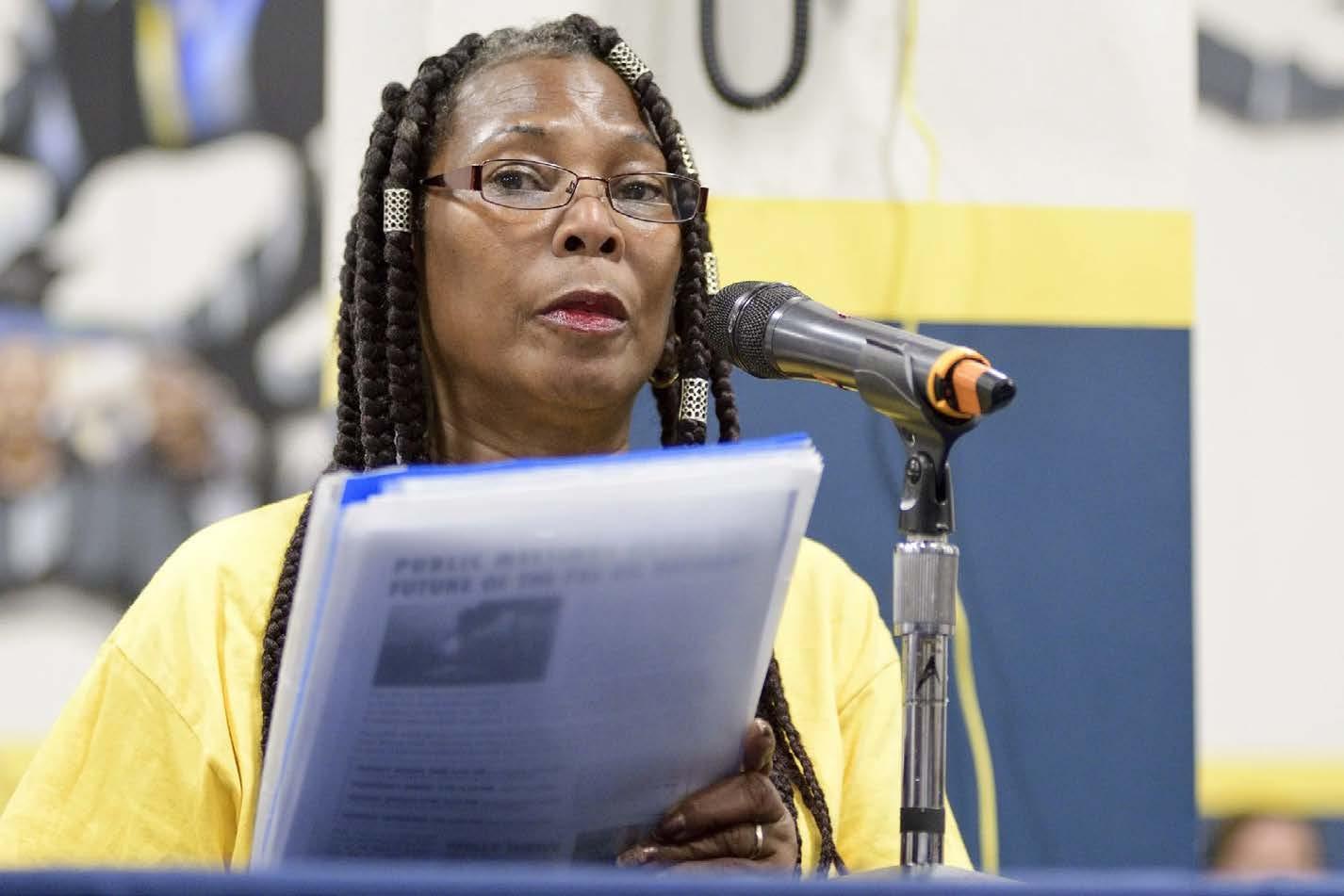
COURTESY OF BASTIAAN SLABBERS 41 VOL/ 20 24
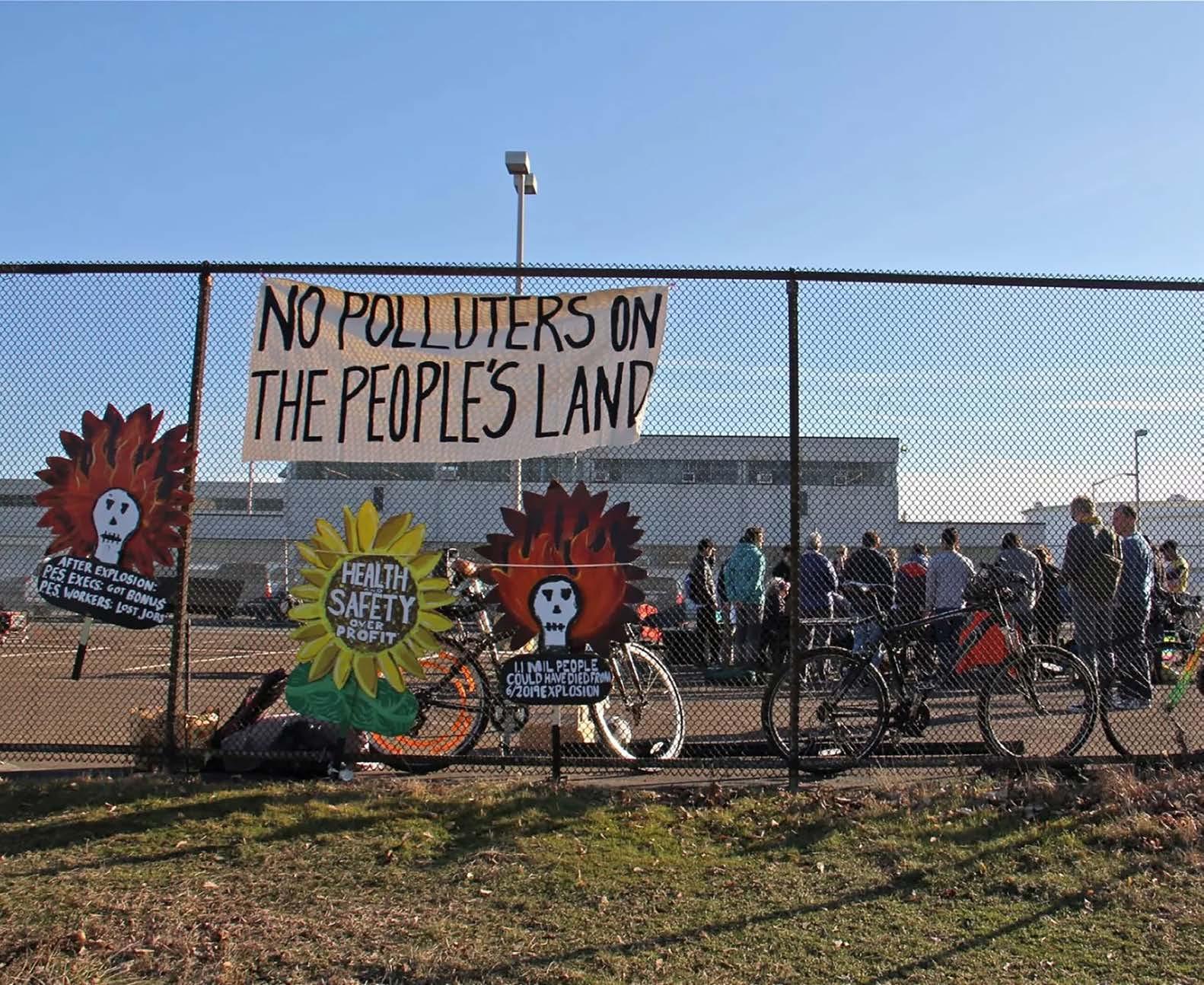
Protection Agency requires companies to monitor benzene and related VOCs around the fenceline of a refinery, and this has provided communities around the country with a modicum of data about the air they breathe over the years. But the data is severely limited because it measures air quality only around the perimeter of the facility itself and is averaged over two-week periods. In Philadelphia, it has never been provided to community members in a format that they could reliably access and interpret.
With the help of Lisa Frueh, a Dornsife doctoral student in environmental and occupational
health, and Karlin Moore, a Dornsife master’s student in biostatistics, the research team will rotate the testing units throughout the affected neighborhoods every week to understand how pollution varies across space and time. They will be able to identify where specific metals within the fine particulate matter — such as manganese or lead — may raise particular concern, and how changes in wind patterns affect air quality over the course of the year. Members of Philly Thrive are eager to assist with the field work.
The ultimate goal is to make these findings accessible to ordinary citizens. “If we can translate
EMMA LEE/WHYY 42
Protesters gather in a parking lot at the Philadelphia Energy Solutions refinery office on Passyunk Avenue in South Philadelphia on Feb. 9, 2020.

reports into something that’s legible for the people making the decisions,” Frueh says, “we can play a supporting role, helping to amplify community concerns that are already there.”
After years of searching for the truth from the EPA and the two corporate entities sharing responsibility for remediation of the site — Evergreen Resources Group and Hilco Redevelopment Partners — the people of South Philadelphia will have information they can trust and act upon.
“We are an unbiased third party,” says Clougherty. “We’ve taken the time to make sure they understand and are comfortable with our methods. So if we tell them concentrations have gone down, that can provide relief to them.”
A RAFT OF RESEARCH
The Environmental Collaboratory’s mission is to bring researchers and community members together to tackle environmental challenges. That
“We can play a supporting role, helping to amplify community concerns that are already there."
means that every research project it funds must address a climate-related or environmental justice problem identified by community members themselves — and co-led by a community-based organization.
Initial funding for the Collaboratory came from a $2 million, two-year grant from the Waverley Street Foundation. Further funding will come from project-based federal grants — it has already received a small prize from the Department of Energy — and co-funding with community-based organizations, with the eventual goal being an endowment.
All parties involved in Collaboratory projects are expected to take an historical, holistic, human view of environmental issues that examines why problems exist and who they harm. In addition to Clougherty’s air-quality study, the Collaboratory awarded research grants to six other inaugural projects in 2022.
The Collaboratory is also pursuing funding for a separate effort that will focus on protecting
people and places from climate change’s impact on flooding and extreme weather through the use of early-warning systems and emergency preparedness and response. The work will be done in consultation with the most vulnerable communities and water utilities in the region.
It is also laying the groundwork for a bipartisan group that will work to advance climate solutions locally, sharing best practices and conducting workshops for government officials who want to implement climate-centered projects such as clean energy or infrastructure adaptations. At every step, Stanislaus wants the Collaboratory to be part of “on-the-ground solution building” that brings along all stakeholders necessary for implementation.
The Collaboratory’s community-driven approach is “an excellent model” for how to make research meaningful and effective, says Johnston of Lewis-Clark State College: “They’re the stakeholders. They’re the people affected by the environmental conditions — the air, the water, the soil, their surroundings.”
‘OUR GRANDCHILDREN’S FUTURE’
When Carol White’s mother died of cancer two years ago, Carol couldn’t help but wonder if the refinery had something to do with it: She’d been living near the refinery for more than 25 years; her mother had visited so many times, every weekend for years… each breath pulling in poison. Now Carol worries about her grandchildren.
In Philly Thrive, White has found a way to push back against the entities responsible for the pollutants that have harmed her family and friends. And in the Collaboratory’s research, she and her neighbors can gain the detailed data, and the means to interpret it, that they need to change their circumstances.
“If we as a community don’t come together and fight these people, it’s doomed to happen again,” White says. “We’re fighting more than one devil here. How do you become a survivor if you’re not able to find the source of it all? Our children and grandchildren won’t have a future unless we do something now.”
This story was originally published in Drexel's EXEL Magazine, the research magazine of Drexel University. EXEL is published semi-annually by Drexel’s Division of University Marketing & Communications in conjunction with the Office of the Vice Provost for Research.
43 VOL/ 20 24




Moving the needle on diversity, equity, and inclusion in the Fire and Rescue Service by creating a guide to compassionate care.
 BY VICTORIA GALLOGLY
BY VICTORIA GALLOGLY
in 2023, the center for Firefighter Injury Research and Safety Trends (FIRST) at the Dornsife School of Public Health (DSPH) was awarded a Federal Emergency Management Agency (FEMA) grant to develop DEI FIRE—a toolkit with education, assessment, and training materials to help to the fire and rescue service achieve its vision of diversity, equity, and inclusion (DEI).
This work is in partnership with the Metropolitan “Metro” Fire Chiefs Association, a membership group of the largest fire and rescue departments in the United States. The Metro prioritized DEI initiatives through a policy statement adopted at the Urban Fire Forum in September of 2022.
To develop the DEI FIRE Toolkit, FIRST worked with fire service affinity groups, faculty, and DSPH graduate students. This project was led by Crystal Yates-Gale, MBA, who served as the FIRST Center DEI Project Manager throughout 2023.
Yates-Gale was a 22-year veteran of the Philadelphia Fire Department, beginning her career as a paramedic and retiring as the department’s first female Black deputy EMS commissioner. She is a long-time supporter of the FIRST Center, educating the center’s Firefighter Injury Research, Epidemiology, and Evaluation (FIRE) Fellows about her role and how her identity as a Black woman in the fire service impacted her personal and professional life.
“With [these] tools... the fire and rescue service can work toward its expressed goals of becoming a more diverse, equitable, and inclusive industry.”
Responders. This guide provides firefighters, paramedics, and Emergency Medical Technicians (EMTs) with training on how to interact with LGBTQ+ patients in a way that leads to optimal and respectful care. The guide includes a glossary of terms commonly used when discussing LGBTQ+ issues. It also has a practical component, featuring case studies and scenarios of situations where EMS responders interact with members of the LGBTQ+ community. Each scenario has suggested dialogue and an after-action review to help frame the contents of the guide for practical use in the field.
The guide was piloted in several metropolitan fire and rescue departments throughout 2023. During this phase of piloting, FIRST trained fire department leadership on how to use the guide and field tested the scenarios included in the guide. Now, as a FIRST Center affiliate faculty member and an associate professor at Hamline University, Voyles will lead field testing and evaluation of the guide with department rank-and-file.

DSPH alum Casper Voyles, PhD, MPH, worked with the FIRST Center during the early phases of toolkit development as a Global Alliance for Training in Health Equity Research (GATHER) Postdoctoral Fellow. He led the development of the first tool in the DEI FIRE Toolkit—the LGBTQ+ Resource Guide for Emergency Medical Services (EMS)
FIRST also partnered with Sam Hurley, EMS director of Maine State, who created a web-based training for Maine EMS providers on how to care for LGBTQ+ individuals with cultural humility. During their 2023 FIRE fellowship, DPSH MPH students Eamonn McCullough and Asha-Leigh Ashton reviewed the course and made evidence-based recommendations for how it could be improved. Under this newfound partnership with Maine State EMS, the FIRST team revised the curriculum and developed a new course evaluation plan.
DSPH alum Arianna Hall, MPH, created storyboards for the course in preparation for moving it to the recording phase where it will be hosted in Drexel’s learning management
46
THIRD EYE PRODUCTIONS, INC.
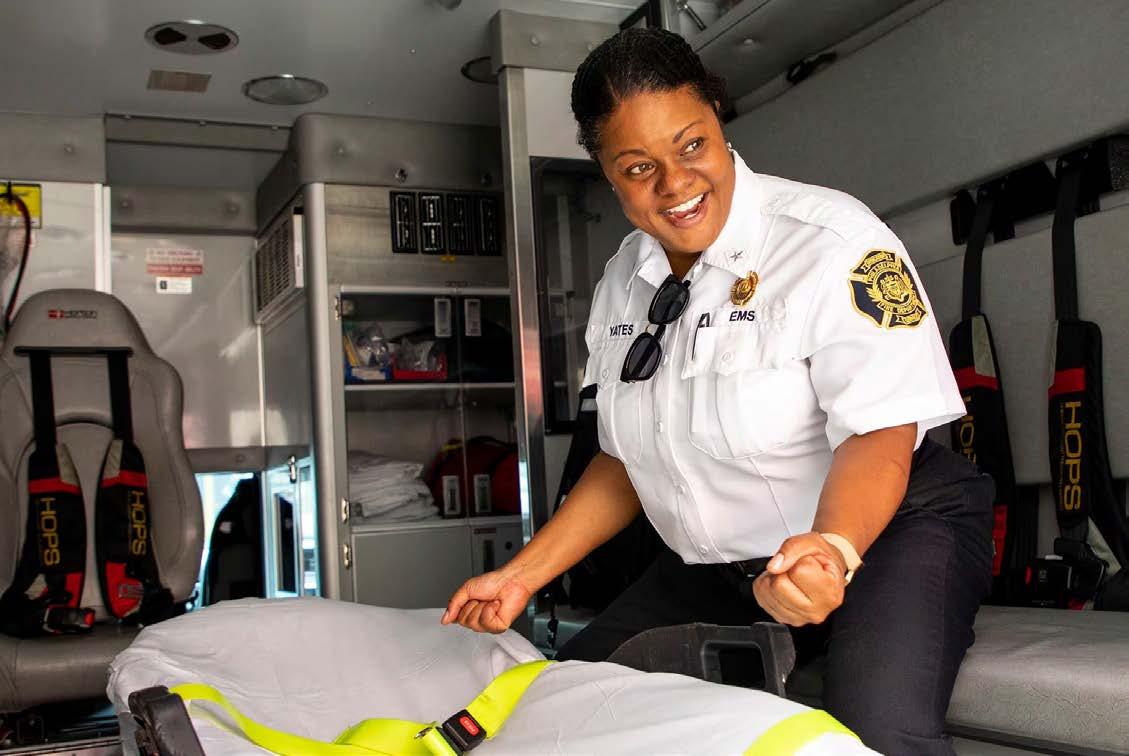
system run by the university’s Instructional Design and Multimedia Services Department. Hall’s Integrative Learning Experience, an integral part of the MPH program at DSPH, entailed conducting a qualitative analysis of how fire and rescue service leaders view the idea of collecting data on sexual orientation and gender identity within their workforce. From this analysis, she developed a whitepaper report and PowerPoint educational resource that are also part of the DEI FIRE Toolkit.
A survey to measure department attitudes toward DEI was developed by Yates-Gale alongside Jennifer Taylor, PhD, MPH, CPPS, director of the FIRST Center, and FIRST affiliate faculty member at DSPH, Randall Sell, ScD, MS, MA. As her Integrative Learning Experience, DSPH MPH student Mobolawa Adio began designing and launching the online DEI survey, evaluating its
response rates and assessing barriers to its dissemination. Adio was a FIRE Fellow in 2021 and 2023 and is deeply familiar with the fire and rescue service and the goals of the DEI FIRE Toolkit, having developed LGBTQ+ resource guide scenarios and other aspects of its training components.
“With tools like the LGBTQ+ resource guide, the cultural humility web-based training course, and the DEI receptivity assessment, the fire and rescue service can work toward its expressed goals of becoming a more diverse, equitable, and inclusive industry,” said Taylor.
The FIRST Center has been invited by the United States Fire Administrator, Lori MooreMerrell, DrPH, to present on this work at the World Fire Congress in 2024. Future grant funding will allow the FIRST Center to train first responders on the DEI FIRE Toolkit and evaluate its impact on the industry.
47 VOL/ 20 24
TYGER WILLIAMS/PHILADELPHIA INQUIRER
CRYSTAL YATES-GALE, MBA, WALKS THROUG A MEDIC 4 AMBULANCE, REMINISCING ABOUT HER TIME WORKING AS A PARAMEDIC.
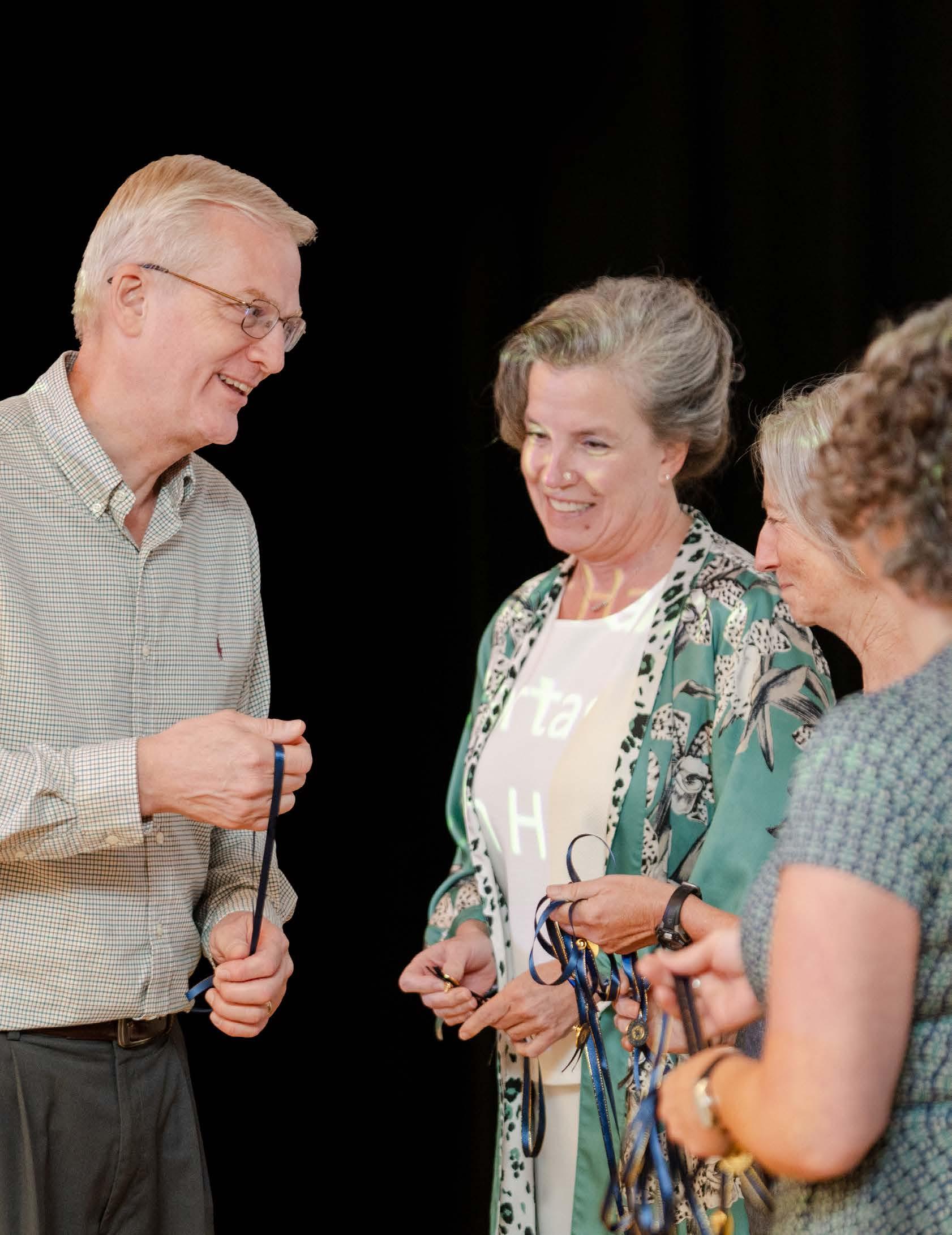
At the Welcome and Pinning Ceremony, Dr. Craig Longenecker receives the school's Health and Human Rights pin from faculty members representing their departments: Dr. Jennifer Taylor, Dr. Yvonne Michael, and Dr. Amy Carroll-Scott.
AT THE START of the 2023-2024 academic year, Drexel Dornsife
School of Public Health welcomed
10 new faculty members in various departments. Their expertise addresses topical and prevailing population health issues, including Black paternal health, infectious disease epidemiology, tobaccorelated health disparities, social stratification, global health, health information systems, child trauma, disordered eating, immigration, community-based participatory research, and more. They bring a range of disciplines in public health to enrich the School's research and academic programs.
20 24 49 DORNSIFE Highlights
VOL/
Meet our 10 new Faculty Members
Community Health and Prevention

Kristal Lyn Brown
PhD, MSPH, Assistant Professor, College of Nursing and Health Professions, Secondary Appointment in CHP
Brown joins Drexel as part of the second cohort of the Drexel FIRST program. By training Brown is an interdisciplinary health equity scholar. Her work sits at the intersection of stress, obesity and disordered eating. She uses mixed methods and behavioral clinical trials to make lifestyle interventions more equitable.
Brown has two focus areas under the umbrella of improving interventions in service of health equity: 1) Identifying novel targets and 2) intervention adaptions. She is particularly interested in the role of exposure to racism, racial identity and other contextual factors related to cardiovascular/cardiometabolic health. In her second focus area, she explores ways in which to adapt interventions in service of health equity.
50 Highlights FACULTY DORNSIFE
Emily Gallagher Writing

Bertranna A. Muruthi
PhD, MS, Assistant Professor
Last year Muruthi joined the College of Nursing and Health Professions, and this academic year she is at DSPH. She was part of the inaugural cohort of Drexel FIRST (Faculty Institutional Recruitment for Sustainable Transformation) faculty. Muruthi’s current research looks at the family as the unit of analysis within the context of communities and the commu nity-based organizations that serve them. As such, family needs and resilient behav iors are understood at a systemic level. There are three areas that she addresses to develop her program of research: (a) migration, resettlement, and transnationalism of documented and undocumented immigrants; (b) predictors of risk and resilient behavior in immigrant families; and (c) development of intervention and prevention programming for immigrant families. Her research uses culturally responsive community-based collaborative methods. She uses this strength-based model to look at individuals and families within the context of communities and the community-based organizations that serve them. She also incorporates community culture and knowledge and practices throughout research with the aim of producing culturally effective actions that lead to community transformation and social change.

Lilianna Phan
PhD, MPH, MS, Assistant Professor (DSPH, 75%), Secondary Appointment in Nursing (CNHP, 25%)
Phan joins Drexel as part of the Drexel FIRST program. Her program of research focuses on understanding multi-level determinants of tobacco use disparities and leveraging health communication science to help reduce these disparities and promote health equity. Her research aims to help prevent and reduce commercial tobacco use among racially minoritized populations, particularly young adults. She utilizes community-engaged, mixed-methods, and experimental approaches including eye-tracking to understand psychosocial factors associated with commercial tobacco use and develop health education interventions.

Arturo Zinny
LPC, MA, PhD(c), Assistant Clinical Professor
Zinny was recently named the executive director of Dornsife's Center for Nonviolence and Social Justice. He previously served for five years as Program Director of Healing Hurt People, a hospital and community-linked violence intervention program housed within the CNSJ. Prior to this role, he was Project Director of the Philadelphia Alliance for Child Trauma Services at Community Behavioral Health and Director of Behavioral Health at Congreso de Latinos Unidos. His research and professional interests have focused on the implementation of evidence-based and promising practices for trauma-impacted children, adults, and their families.
51 VOL/ 20 24
DORNSIFE
Epidemiology and Biostatistics Highlights FACULTY

J. Craig Longenecker
MD,
MPH, PhD, Teaching Professor
Longenecker joined the department after serving at Kuwait University’s College of Medicine and College of Public Health. During his tenure there, he taught a wide range of students, including medical students, medical residents, and public health students at the BSc and MPH levels. As Inaugural Vice-Dean, Academic, in the College of Public Health between 2015 and 2021, he was instrumental in launching the college. As an educator, he has taught courses at the undergraduate and graduate levels, including topics in clinical epidemiology, chronic disease epidemiology, research methods, community medicine, general public health, health promotion, and disease prevention. His research interests have focused on non-communicable diseases, particularly cardiovascular and renal disease, hypertension, and diabetes. He also has experience in national health surveys in Kuwait such as the World Health Organization STEPS Study and the Kuwait Salt Intake and Renal Disease Study, which have been used to inform public health practice in that country.

Goro Yamada
PhD, MHS, MHS, MMS,
Assistant Teaching Professor of Biostatistics
As a family scientist, Muruthi’s Yamada teaches biostatistical methods with an interest in effective learning and teaching and applying analytical methods to research and public health practices. He also oversees the data and analytical aspects of the SALURBAL project, a multi-country collaborative research project on urban health in Latin America. Before joining Drexel, Yamada served as an epidemiologist, biostatistician, and public health officer at Johns Hopkins Bloomberg School of Public Health, WHO (World Health Organization), and JICA (Japan International Cooperation Agency). His fields of experience include data management and analysis, health information systems, disease control, maternal and child health, and project management and evaluation. He has worked in the U.S., Japan, Switzerland, Bolivia, Honduras, Ethiopia, Zimbabwe, and Ghana.
Environmental and Occupational Health

Ericka Kalp
Kalp has 20 years of experience in epidemiology and infection prevention and control across acute care, long-term care, ambulatory care, and specialty clinics. She is currently the director of infection prevention and control and consulting at ECRI. She taught epidemiology and research methods at Shippensburg University and Chamberlain University. Prior to these roles, Kalp served as an epidemiologist and program manager at the Pennsylvania Department of Health for the Bureau of Epidemiology’s Healthcare-Associated Infection Prevention and Antimicrobial Stewardship program. Kalp was the director of epidemiology and infection prevention at WellSpan Health (formerly Summit Health) for fourteen years. She has also been project coordinator and senior research assistant at Johns Hopkins University School of Medicine, infection control epidemiologist at Maryland’s Department of Health and Mental Hygiene, and bioterrorism surveillance review epidemiologist for Maryland’s Department of Health and Mental Hygiene.
52
PhD, Part-Time Associate Clinical Professor
Health Management and Policy

Adaobi Anakwe
PhD, MPH, Assistant Professor
Anakwe studies the preconception (and perinatal) health of men and women with the goal of improving health outcomes for Black families and communities. Currently, her work seeks to address disparities in maternal and child health outcomes by focusing on paternal contributions to these disparities. She applies health equity lenses, with emphasis on the effects of intersecting roles/identities, and social, structural, and political determinants, to examine Black men’s health prior to having pregnancies with their partner(s), their health development across the life course, and the implications of these changes for mothers, children, and men themselves. She is an expert in Black paternal health. She is experienced with utilizing quantitative, qualitative, and mixed methods approaches; and community-based participatory research that centers community voices with relevance for health policy. Anakwe’s research includes domestic and international global health equity-focused projects that focus on creating an understanding of and improving the social conditions that drive paternal health inequities experienced by the Black/African male diaspora.

Christy Dure
MPH, MHA, Assistant Teaching Professor
With over a decade of dedicated service in the healthcare field, Dure brings a wealth of experience and expertise to the forefront. Her journey through dentistry, healthcare administration, consulting, and academia has been marked by a relentless pursuit of excellence and a commitment to improving healthcare systems.
Her career commenced in dentistry, where she honed her skills through various clinical and administrative roles in private practice. She distinguished herself by successfully overseeing Electronic Medical Record (EMR) mergers, navigating complex health compliance regulatory affairs, and providing invaluable guidance on dental health services to military services. Transitioning to the academic sphere, Dure served as a supervisor at Rutgers School of Dental Medicine, where she orchestrated courses for practicing physicians, focusing on their Continuing Education (CE) requirements. Later, at NYU Rory Meyers College of Nursing, she worked as the college's compliance officer and liaison, adeptly handling reporting models for the New York State Board of Education.

Gabriel (Gabe) Schwartz
PhD,
Assistant Professor of Health Management & Policy & Urban Health Collaborative, secondary appointment in Nursing at Drexel's College of Nursing and Health Professions
Schwartz joins DSPH as part of the second cohort of the Drexel FIRST program. He is also a faculty member at the Drexel Urban Health Collaborative. His work examines how social stratification and the places we live shape health across the life course. It treats structural, racialized exploitation as a population health problem, including housing insecurity, segregation, and the criminal legal system. Ongoing lines of research specifically focus on the health impacts of eviction and on how racial segregation in our schools and neighborhoods bends health trajectories as children age, as well as descriptive work about the population health burden of police violence.
53 VOL/ 20 24
Building Collective Resilience at Dornsife

IN RECENT YEARS, everyone, including members of the Dornsife School of Public Health (DSPH) community, has experienced and witnessed multiple forms of collective trauma. As many in the field of public health know and see firsthand, individual experiences of loss and outrage accumulate, making one’s wellness and cohesion more fragile with each trauma.
To explore opportunities for healing and growth, Gina S. Lovasi, PhD, MPH, DSPH dean; Mariana Chilton, PhD, MPH, professor of health management and policy and director, Center for Hunger-Free Communities; and Cindy Ngo, student engagement and events coordinator, requested ideas from students, faculty, and staff to generate energy, freshness, and wellbeing.
From this inquiry the development of the Collective Resilience Fellowship arose. This year's fellows include students Divya Chanda, Raksha Radhakrishna Shastry, and Richa Prakashkumar Prajapati. These fellows are tasked with creating ideas for building resilience and supporting the planning of activities, events, and communication materials.
“I aim to establish a safe space for emotional expression and connection,” said Radhakrishna Shastry. “I see my work as an integral part of ensuring that our community not only survives but thrives, thus preserving the essence of learning, resilience, and connection within the school.”
So far in the 2023-24 academic year, there have been/are a series of events scheduled that members of the DSPH community can engage in monthly. Also, various communications on
Collective Resilience Fellows Raksha KR Shastry, Divya Chanda, and Richa Prakashkumar Prajapati planned thoughtful student activities including Listening from the Heart (above) and the Wall of Wellness (below).




54
Highlights DORNSIFE
this topic have been shared from leadership in collaboration with the fellows to the DSPH audience.
Also beneficial to this initiative, there are several members of DSPH who utilize trauma-informed, healing-centered approaches in their work. For example, the Center for Hunger-Free Communities which Chilton directs utilizes a healing-centered approach to ensure that the ongoing onslaught of interpersonal, historical, and collective traumas due to racism, gender-based violence, and hunger can be transformed. “One of the most important lessons we have learned while helping people heal from trauma is that people cannot handle suffering alone,” she shared.
Building collective resilience at DSPH is needed to move ahead. “Without taking time to process these traumas, one may be able to keep doing the next task on the to-do list, but there is the risk of breaking apart one's sense of self, purpose, and belonging,” said Chilton. “We risk doing professional activities without a mindset that allows us to support each other and keep learning. And learning together is at the very core of who we are as an organization, and what we need to keep moving forward.”
Lovasi underscores the importance of this work: “The future of public health depends on us to be resilient and connected."
Building collective resilience at DSPH is needed to move ahead. “Without taking time to process these traumas, one may be able to keep doing the next task on the to-do list, but there is the risk of breaking apart one's sense of self, purpose, and belonging .”
55 VOL/ 20 24
AWARDS, HONORS AND FUNDED RESEARCH
Throughout 2023, Dornsife faculty received impactful research grants, noteworthy accolades, and acted locally and globally to improve population health .
12.1 The Ubuntu Center on Racism, Global Movements, and Population Health Equity at Dornsife has been selected to lead a $6 million project funded by the Robert Wood Johnson Foundation that puts the needs, ideas, and voices of the community at the forefront to address deep-rooted structural racism within the healthcare industry and advance equity and justice in healthcare system.
11.30 Dornsife's Center for Nonviolence and Social Justice (CNSJ) was once again selected to receive a grant from the Philadelphia Eagles through the Eagles Social Justice Fund. CNSJ's executive director is Arturo Zinny, LPC, MA, PhD(c), assistant clinical professor in the Department of Community Health and Prevention.
11.08 Joseph Amon, PhD, MSPH, clinical
professor and director of the Office of Global Health, was appointed the editor-in-chief of the Health and Human Rights Journal. The journal is co-published by Drexel Dornsife and Harvard University’s FrançoisXavier Bagnoud (FXB) Center for Health and Human Rights.
11.07 Dornsife's Urban Health Collaborative received a multi-million dollar grant from the National Institute of Environmental Health Sciences to establish the Drexel Climate Change and Urban Health Research Center.
The center will be based at Drexel with additional research centers at the University of California, Berkeley, the University of Sao Paolo in Brazil, and the Institute of Nutrition of Central America and Panama in Guatemala.
The Urban Health Collaborative is directed by distinguished university professor of
epidemiology Ana Diez Roux, MD, PhD, MPH, and co-directed by assistant professor Usama Bilal, MD, PhD, MPH.
9.29 Dornsife received a 5-year $20 million award through the NIH's Community Partnerships to Advance Science for Society (ComPASS) program to lead a national coordinating center that will study health equity solutions. Principal investigators Amy Carroll-Scott, PhD, associate professor and chair of Community Health and Prevention, and Jan M. Eberth, PhD, professor and chair of Health Management and Policy, will lead the center and its multidisciplinary team.
9.14 The Robert Wood Johnson Foundation renewed their Transforming Academia for Equity program funding at Dornsife enabling the school to continue to expand its work to identify and
challenge systems that have hindered the pace and innovation of health equity research.
Reneé H. Moore, PhD, research professor of epidemiology and biostatistics; director of the Biostatistics Scientific Collaboration Center (BSC); and associate dean for Diversity, Equity, Inclusion and Belonging at Dornsife, is the co-PI alongside former Dornsife faculty member Scarlett Bellamy, PI.
8.08 Agus Surachman, PhD, assistant professor of epidemiology and the Drexel FIRST program in the Dornsife School of Public Health, with a secondary appointment in the College of Nursing and Health Professions, and other co-principal investigators received $50,000 in pilot funding from Jefferson University’s Sidney Kimmel Cancer Center — Drexel University Consortium for a project titled: “Financial Hardship, Daily Stress Process, and Inflammation Among Cancer Survivors.”
56
7.28 Mariana Lazo, MD, PhD, ScM, associate research professor, department of Community Health and Prevention and the Urban Health Collaborative, and her team received an NIH R01 grant to address large and sustained liver disease disparities. The team includes research partners at the Lundquist Institute for Biomedical Innovation at Harbor-UCLA.
7.14 Researchers led by Esther Chernak, MD, MPH, FACP, Director of the Center for Public Health Readiness and Communication (CPHRC) and Clinical Professor in the Department of Environmental and Occupational Health at DSPH and the College of Medicine, and Melissa Kaufman, EdD, Interim Associate Dean for Education, received a grant from the Pennsylvania Department of Health to develop training programs in infection control and emergency preparedness for nursing home and long-term care facilities’ staff.
7.13 Longjian Liu, MD, PhD, associate professor at Dornsife School of Public Health, has been awarded a 2-year National Institutes of Health R21 grant of $403,090 to investigate the intricate connections between vascular and metabolic disorders and their potential
influence on the development of cognitive impairment and dementia in older adults. This study will investigate the predictive significance of various factors, including phenotypes and genotypes, in relation to the risk of cognitive impairment and dementia onset in this population.
6.16 Sharrelle Barber, ScD, MPH, assistant professor and director of the Ubuntu Center on Racism, Global Movements and Population Health Equity at the Dornsife School of Public Health, received the Sherman A. James Diverse and Inclusive Epidemiology Award at the Society for Epidemiologic Research annual meeting in Portland, OR. This award recognizes an individual who has demonstrated research, teaching, or service that expands the scope of the field to underrepresented or disadvantaged populations or researchers, and with an impact that has facilitated greater diversity and inclusiveness.
6.16 Usama Bilal, MD, PhD, MPH, assistant professor at the Dornsife School of Public Health and the Urban Health Collaborative (UHC), was awarded the Brian MacMahon Early Career Epidemiologist Award at the Society for Epidemiologic Research annual
meeting in Portland, OR. This award recognizes early career epidemiologists who have already made substantial contributions to the field and are poised to become future leaders in epidemiology.
5.22 Jan M. Eberth, PhD, professor and chair of the department of Health Management and Policy at the Dornsife School of Public Health, received a $764K American Cancer Society research scholar grant to assess equity in shared decision making, utilization, and outcomes of lung cancer screening.
5.02 Brian Lee, PhD, associate professor of epidemiology, received a 5-year National Institutes of Health (NIH) R01 grant of $4M to study possible links between neurodevelopmental disorders and the risk of developing neurodegenerative disorders later in life.
3.08 Alex Quistberg, PhD, MPH, associate research professor with the Drexel Urban Health Collaborative, and a multidisciplinary team were awarded a grant to link urban health outcomes to climate change and contribute to AI risk models.
2.15 Alina SchnakeMahl, ScD, MPH, assistant professor
of health management and policy and Usama Bilal, MD, PhD, MPH, assistant professor of epidemiology, provided an invited commentary in the American Journal of Epidemiology on a recent article by Dimitris et al., where they discuss social epidemiologic lessons from the COVID-19 pandemic.
2.01 Jane Clougherty, MSc, ScD, professor, and Anneclaire De Roos, PhD, MPH, associate professor, both in the department of Environmental and Occupational Health at the Dornsife School of Public Health, were named research members of the Philadelphia Regional Center for Children's Environmental Health, housed within the Children’s Hospital of Philadelphia (CHOP) and Penn Medicine. This new center will address threats to children's environmental health. Through the EPA's Science to Achieve Results (STAR) program, Clougherty will also be leading research that identifies the key community stressors to alleviate the impacts of climate change on children’s health in Upstate New York.
1.30 Jaquelyn Jahn, PhD, MPH, assistant professor in the department of Epidemiology
To learn more about research projects and progress, visit bit.ly/ DSPHfunding.
and Biostatistics and The Ubuntu Center on Racism, Global Movements and Population Health Equity, was awarded $347K by the Robert Wood Johnson Foundation in January 2023. This funding allows Jahn to study the consequences of ending cash bail for community health equity.
1.13 Sharrelle Barber, ScD, MPH, assistant professor of epidemiology and director of the Ubuntu Center on Racism, Global Movements and Population Health Equity at Dornsife, was featured in a Diverse Issues in Higher Education Emerging Scholar piece about her career, advocacy, and more.
1.13 Marla J. Gold, MD, professor in the department of Health Management and Policy, dean emerita of Dornsife, and Drexel’s senior vice provost, community health and chief wellness officer, was named the recipient of the 2022-2023 Phyllis Marciano, MD '60, Woman in Medicine Award. Drexel University’s College of Medicine honored Gold for her leadership, mentorship, and patient care. Gold retired in 2023 after serving Drexel with distinction for over three decades.
57 VOL/ 20 24
DORNSIFE
Jack Pellegrino Highlights
STUDENT

Jack Pellegrino’s path in public health began in his undergraduate education at the University of South Carolina. Beyond his foundational coursework, he supported research projects dedicated to understanding risk factors associated with malaria, COVID-19, neonatal hypothermia, and postnatal depression which helped solidified his decision to further his education in epidemiology.
Another deciding factor, Pellegrino interned with the COVID-19 Containment Division at the Philadelphia Department of Public Health during the summer of 2022. He credits both experiences for giving him a strong background in research design, data analysis, and community outreach.
Originally from Norristown, returning to the Philadelphia area, a place he considers home,
for his master's in public health (MPH) was a welcome opportunity. Pellegrino was accepted into the Drexel Dornsife School of Public Health (DSPH) MPH program and was awarded a Dornsife Public Health Research Fellowship for the 2023-2024 academic year. The highly competitive fellowship is for students with a strong interest or experience in urban health and health disparities. The award includes a tuition scholarship and research assistantship that pairs fellows with a faculty mentor.
“I was honored to receive a competitive fellowship. I was extremely excited to learn that I would be matched with a faculty member to assist them with their research,” said Pellegrino.
Pellegrino was paired with Brent Langellier, PhD, MA, associate professor of health management and policy at DSPH, whose research seeks to understand and address drivers of health disparities which aligned with his goals.
"It has been a pleasure to work with a variety of individuals who all have different educational and social backgrounds, and having multiple opinions from different backgrounds has really improved the quality of work we are able to put together."
Langellier is currently investigating the impacts of a community-based organization in Philadelphia called FarmerJawn whose mission is to increase access to organic, non-processed food in the food-insecure neighborhoods in the city. Specifically, Pellegrino is helping him research how the educational programs and urban farms established by the organization will affect the health of these communities.
So far in this research project, Pellegrino has gained a lot of practical experience from collaborations. “I have worked with multiple people from different corners of public health. I have met and worked with staff from FarmerJawn, professors at Drexel, and another fellow graduate student at the University of Pennsylvania,” shared Pellegrino. “It has been a pleasure to work with a variety of individuals who all have different educational and social backgrounds, and having multiple opinions from different backgrounds has really improved the quality of work we are able to put together.”
As the research progresses, Pellegrino will continue to gain skills in designing studies and collecting impactful data. “So far, I have learned a ton regarding study design and the development of tools that will generate data for our study from my colleagues with experience.”
In addition to this hands-on learning experience, Pellegrino has found having a mentor to be a real asset in mapping his career trajectory. “Having a professor in your corner to answer questions that may arise and support your development as a person and a professional is extremely beneficial. It is reassuring to know he is concerned about my future and wants to help me design a path to best reach my goals in the public health field.”
Langellier, along with his fellow faculty members at DSPH, view mentorship as a key component of the DSPH student experience. “Working with faculty mentors is invaluable for public health students in fostering their professional development and contributing to public health. The exposure to real public health research and practice challenges provides students with practical insights and skills, bridging the gap between theoretical knowledge and its application,” said Langellier.
Additionally, Langellier notes the impact students like Pellegrino can have. “Engaging in projects and collaborations that are already established enhances the students' learning experience. It allows them to contribute meaningfully to ongoing initiatives and gain a deeper understanding of public health work without having to develop relationships or create their own project from scratch.”
The exact direction Pellegrino’s career will take after graduation is not certain but what is certain is his commitment to using his training to solve complex public health problems. “A lot of the health disparities are complex and require multiprong solutions and collaboration across different work sectors. I am very interested in working to find solutions to these issues,” he shared.
LEADERSHIP
Gina S. Lovasi, PhD, MPH
Dana and David Dornsife Dean
EDITOR
Emily Gallagher
CONTRIBUTORS
Renee Wagoner • Rebecca Finkel •
Greg Richter • Victoria Gallogly • Ben Seal
ART DIRECTION & DESIGN
Page 33 Studio
PHOTOGRAPHY
Margo Reed
FEEDBACK?
Send your comments on the magazine to dsphweb@drexel.edu.
drexelpubhealth
drexelpublichealth
drexelpubhealth
linkedin.com/school/dsph
drexelpublichealth
To keep up with more Dornsife news, visit drexel.edu/Dornsife
59 VOL/ 20 24
20 24 VOL/
Emily Gallagher Writing
Follow Along
Over the past year, there have been lots of Instagramable moments to share from new student orientation events to graduation celebrations! Be sure to follow along for updates on students, staff, faculty, alumni, and more.
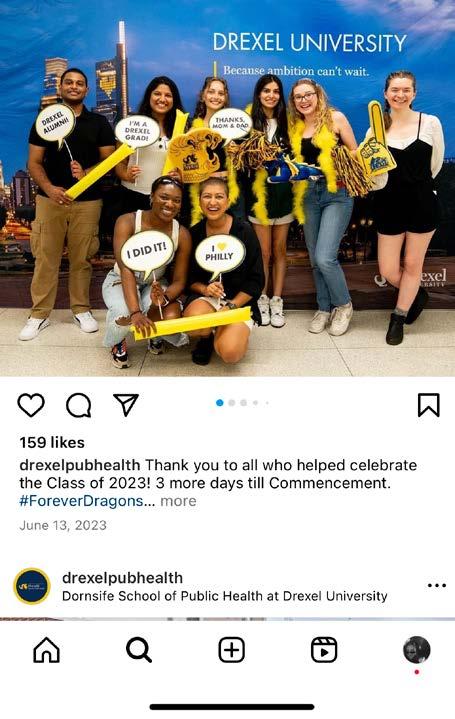

Dornsife School of Public Health
@drexelpubhealth
Dornsife School of Public Health
@drexelpubhealth
“What a journey it has been! Today we celebrated Leslie McClure, Ana Diez Roux, and Jennifer Kolker and their service to Dornsife. Thank you.



“Thank you to all who helped celebrate the Class of 2023! 3 more days till Commencement. #ForeverDragons”
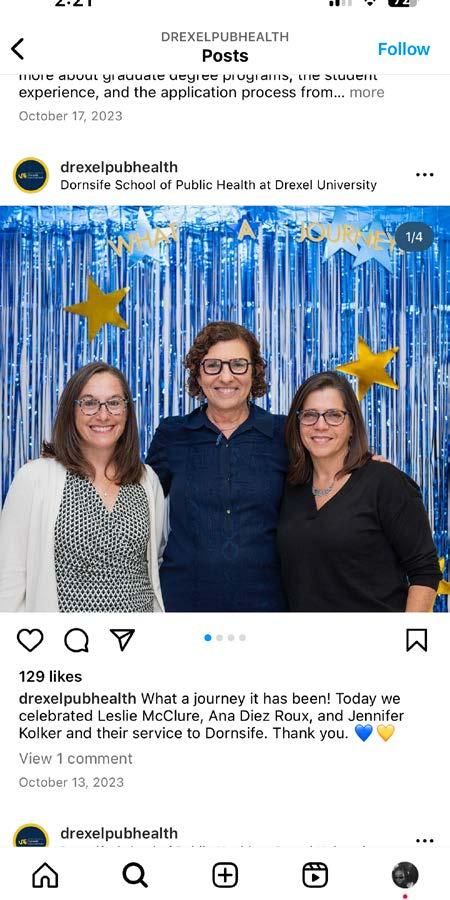

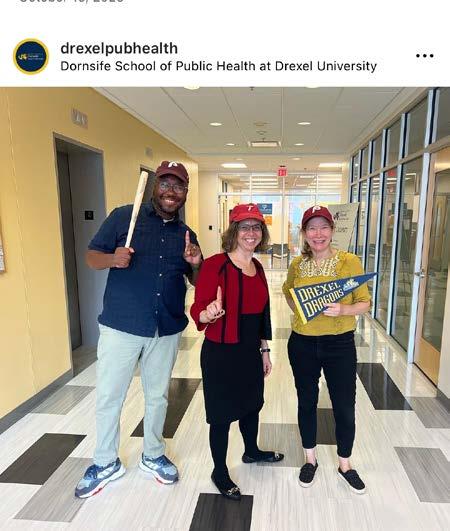
Dornsife School of Public Health @drexelpubhealth
“Phillies phever continues at Dornsife! Go Phillies!”
60 SCROLL CALL
20 24 VOL/
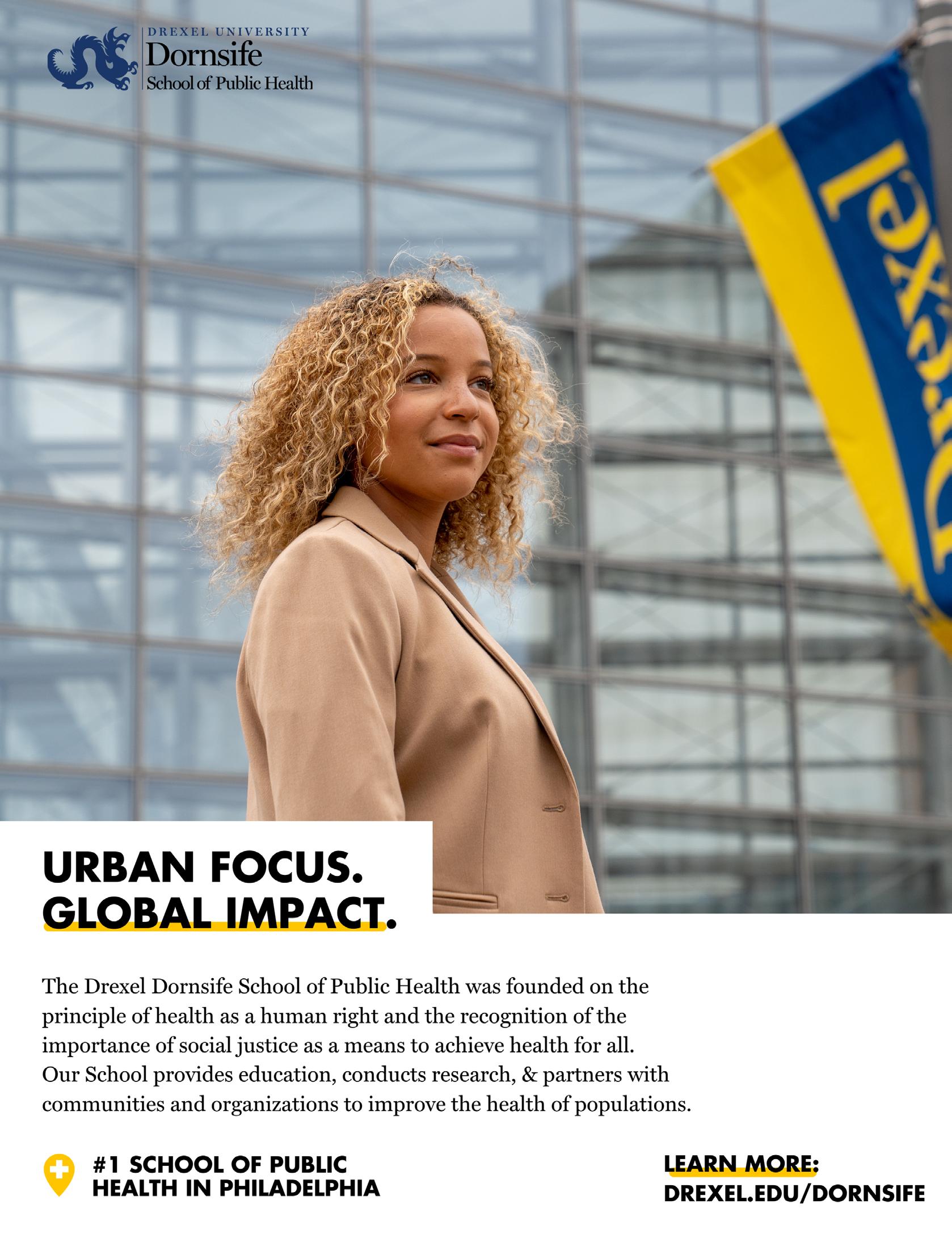
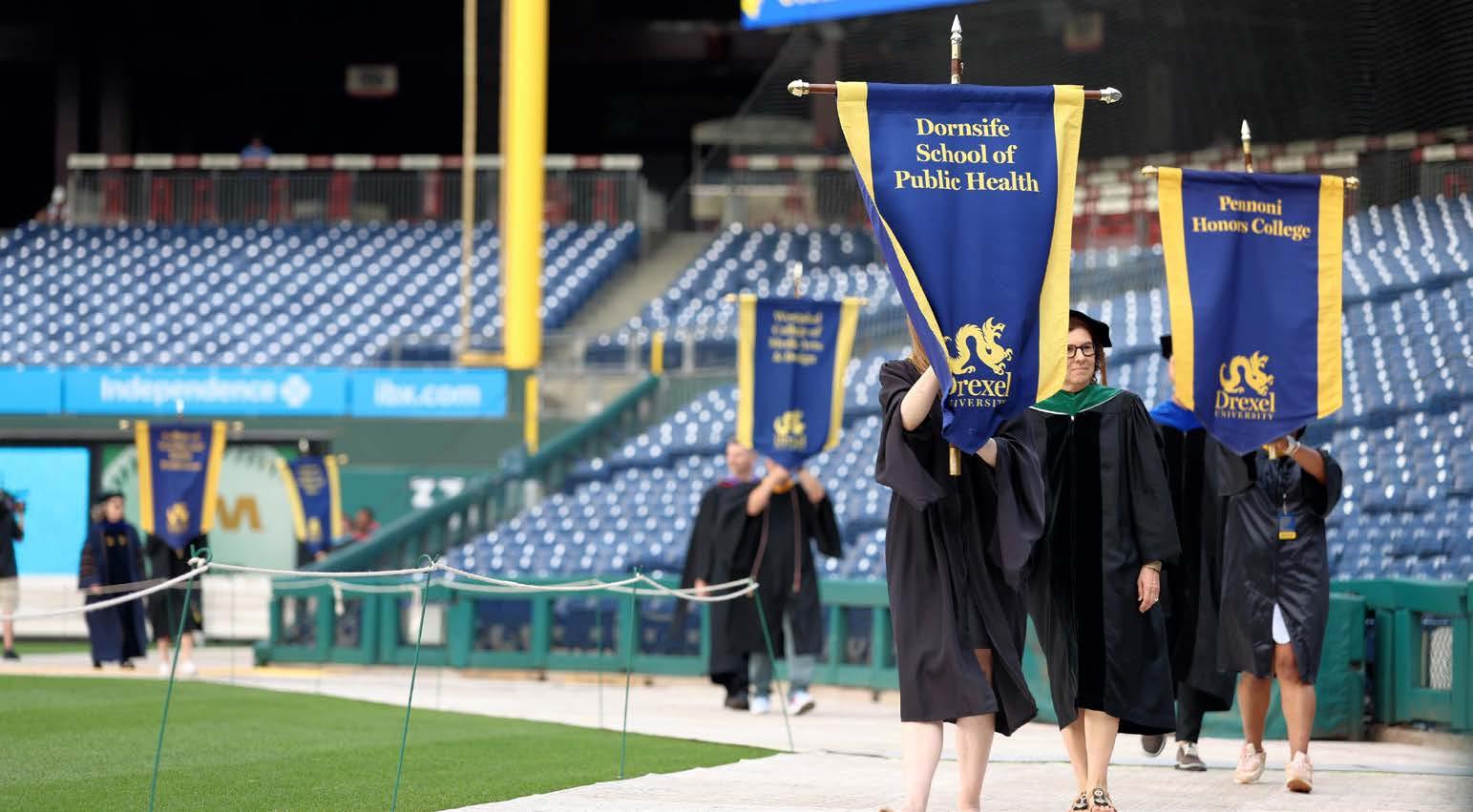
04 252 Nesbitt Hall 3215 Market Street Philadelphia, PA 19104 Non-Profit Org. U.S. Postage PAID Permit #144 Philadelphia, PA














































 BY VICTORIA GALLOGLY
BY VICTORIA GALLOGLY














































